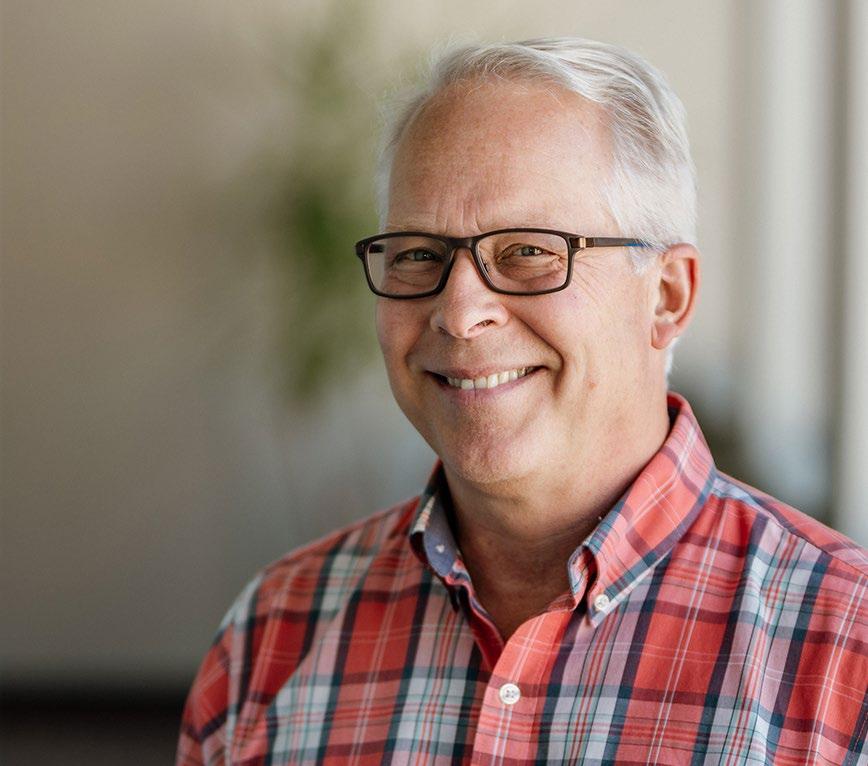
Digest JUNE | JULY 2024 MBHERALD.COM More than sixty years of sharing the life & story of the Mennonite Brethren in Canada As iron sharpens iron Michael Dick’s 39 years of service to the MB family VOLUME 63, NO. 03 PROVINCIAL CONVENTION COVERAGE PRAYING FOR A MIRACLE BEING ROOTED AND BUILT UP
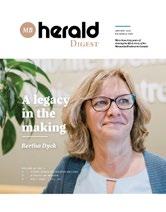
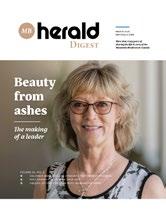
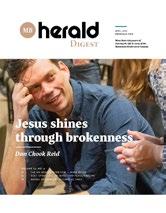
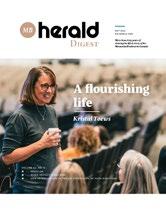

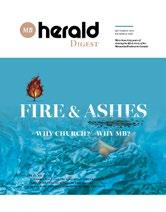
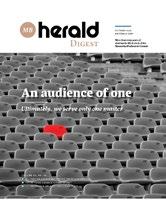
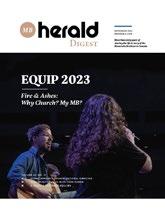
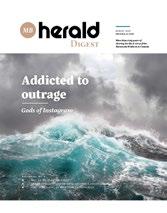
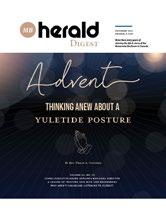
SHARE THE MB HERALD DIGEST WITH YOUR FRIENDS SIGN UP FOR THE MB HERALD DIGEST AT MBHERALD.COM/SUBSCRIBE OR CONTACT US AT (888) 669-6575 MBHERALD@MBCHURCHES.CA THINGS ARE BETTER WHEN THEY’RE SHARED
Mennonite Brethren Herald Digest is digitally published bimonthly by the Canadian Conference of Mennonite Brethren Churches, primarily for the use of its members, to build a Canadian MB community of faith. We seek to 1) share the life and story of the church by nurturing relationships among members and engaging in dialogue and reflection; 2) teach and equip for ministry by reflecting MB theology, values, and heritage, and by sharing the good news; 3) enable communication by serving conference ministries and informing our members about the church and the world. However, the opinions expressed here are not necessarily those of the church as a whole.
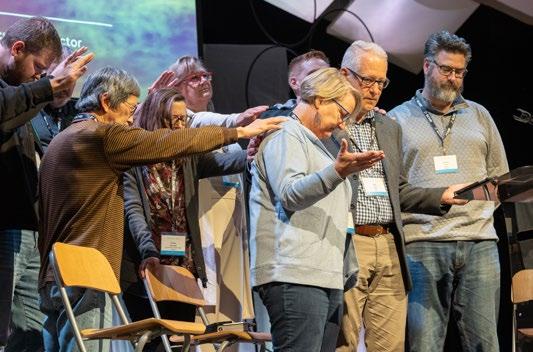
Digest
JUNE | JULY 2024 | VOLUME 63, NO. 03
EDITORIAL OFFICE
1310 Taylor Avenue Winnipeg, Manitoba R3M 3Z6
Phone: 204-669-6575
Toll-free in Canada: 888-669-6575
MBHERALD@MBCHURCHES.CA WWW.MBHERALD.COM
ISSN: 0025-9349
The BCMB Executive Board prays over Reg and Brenda Toews as Reg is commissioned as BCMB’s new Executive Director. Toews began the role in mid-May.
Read the full story on page 10
The Mennonite Brethren Herald is a publication of 4 15
MEET OUR NOMINEES AGM | June 13, 2024
PRAYING FOR A MIRACLE Holly Hannigan
26 21 THE MB HERALD INTERVIEW: COURTNEY ARMSTRONG BEING ROOTED AND BUILT UP Jacquie and Rick Block
CONTENDING IN PRAYER Ken Esau THE SUN STOPPED SHINING
Philip A Gunther

ON THE COVER: Michael Dick retires after 39 years of service in leadership to the MB family. Read the story on page 22
FACEBOOK.COM/MBHERALD TWITTER.COM/MB_HERALD SOUNDCLOUD.COM/MBHERALD MBHERALD.COM Connect
Brethren
CANADIAN CONFERENCE OF MENNONITE BRETHREN CHURCHES CONFÉRENCE CANADIENNE DES ÉGLISES DES FRÈRES MENNONITES
Sharing the life and story of Mennonite
in Canada
16 29
1 MENNONITE BRETHREN HERALD JUNE | JULY 2024
From the editor I
t’s been a while since we last talked. I’ve been quite busy this spring, and I’m sure you have been, too. In my department, we budget for two trips to spring conventions each year and attend MBCM’s Assembly in our home province of Manitoba. I visited Ontario and British Columbia this year and had a fantastic time at both conventions.
I leave each convention feeling inspired, with half a dozen new story ideas in my notebook. Many of the topics we cover on the podcast and in this and upcoming issues of the Digest originate from conversations at provincial conventions. Whether you’ve never attended or it’s been a few years, there’s nothing like gathering in person to get a real feel for the community of Mennonite Brethren across Canada.
Later this month, we will meet virtually for the Canadian Conference of MB Churches’ AGM. Although it’s not the same as meeting in person, this is still a valuable opportunity to connect with the national family of MB churches and be inspired by all that’s happening across Canada. I encourage you to attend. We have some important business to cover, so we need a quorum of church delegates to attend and vote. If at least one delegate from each of our 200+ MB churches participates, we’ll have no trouble reaching our goal. Most churches can send multiple delegates, so we encourage you to contact your pastors and church admin staff to coordinate registration for the AGM. You’ll find more information on the AGM on the next page.
Before I go, I want to draw your attention to some terrific articles from this issue: An interview with camp director Courtney Armstrong on page 26 and a piece on mentoring by Rick and Jacquie Block on page 21. Speaking of mentorship, don’t miss our profile on Michael Dick, who closes off 39 years of service to the MB family this June. Michael has a heart for mentoring and has impacted a generation of leaders in today’s Church.
I want to express my gratitude to our contributors, advertisers, and you, constant readers.
 Carson
CARSON SAMSON Communications director
Carson
CARSON SAMSON Communications director
The MB Herald Podcast is all about telling stories that build up our MB church family. We invite guests on the show to highlight various ministries and initiatives, as well as talk about some of the pressing issues we face in our churches and communities.
NEW EPISODES COME OUT EVERY TWO WEEKS.
Listen on Spotify
Listen on Apple Podcasts
UPCOMING EPISODES
June 6: Leadership Development (Mark Wessner, President of MB Seminary)
June 20: AI and the Church (Mike Engbers, Lead Pastor of Parliament Community Church in Regina, SK)
July 4: Understanding and talking about MAiD with Gloria Woodland (Chaplaincy Program Director at MB Seminary)
July 18: What is spiritual abuse? (Tony Martens, Lead Pastor of Dalmeny Community Church in Dalmeny, SK)
August 1: Ministry to Truckers (Darren Milley, PowerServe Ministries)
2 JUNE | JULY 2024 MBHERALD.COM



National Assembly
AGM
JOIN US ONLINE FOR OUR NATIONAL ASSEMBLY (AGM)
ON JUNE 13, 2024 AT 6 PM CENTRAL!
The National Assembly will be a wonderful opportunity to review the past year and celebrate God’s work through our provincial conferences and our partners Multiply, MB Seminary, and Legacy. It’s a time to pray, set goals and make decisions as one body.
We are also excited to commission Cam Stuart as our new National Director and to hear his passion for what God is doing through our conference. Join us as we welcome him and pray for him as he leads. We will also be voting on new members of the Executive, MB Seminary and Multiply boards and for our nominating committee and provincial representatives.
Please take a moment to look at the 2024 National Assembly (AGM) Agenda and the 2024 Notice of Motions.
REGISTER YOUR DELEGATES NOW!
Each delegate representing a member church must be a church member in good standing over the age of 18. This individual must be approved as a delegate by the church membership or governing body. Each member church is entitled to one delegate per 25 members. Only one pastor delegate is permitted per church.
We need at least 100 delegates to reach our quorum. If every church sent one delegate on their behalf, we would easily reach this number. Registration closes June 10, 2024 at midnight.
Register as a church delegate
Register as a guest
If you have any questions or concerns about the registration process, please contact us at communications@mbchurches.ca
We hope to see you there as we look back at the past year and look ahead to where God is leading us as a conference!
.
CANADIAN CONFERENCE OF MENNONITE BRETHREN CHURCHES CONFÉRENCE CANADIENNE DES ÉGLISES DES FRÈRES MENNONITES
June 13, 2024 | Virtual Meeting
Register at na.mennonitebrethren.ca 3 MENNONITE BRETHREN HERALD JUNE | JULY 2024


AGM Meet our nominees

At CCMBC’s National Assembly on June 13, 2024, we have the privilege of voting new members to the Executive, MB Seminary and Multiply boards and for our nominating committee and provincial representatives. Here’s a brief introduction to each nominee.
EXECUTIVE BOARD

TIM DOERKSON
MODERATOR (TERM: 2024–2026)
Tim Doerksen is a member of Gem MB Church in Gem, AB. He and his wife Yvonne are involved in a family farming and livestock operation with his brother. Along with being the current moderator of his church, he also served on the ABMB board from 2017-2023 and was the moderator for the last three of those years. From 2020-2023 he was the Alberta representative to the national board and served on the National Finance and Audit Committee from 2022-2024. He became Member at Large to CCMBC’s Executive Board in June 2023; in November he was asked to be the Interim Moderator. He brings the ability to listen, communicate, collaborate and facilitate.

VIJAY MANUEL
ASSISTANT
MODERATOR (TERM: 2024–2026)
Vijay Manuel’s career in education and leadership spans 28 years, including 20 years in the Abbotsford School District as a teacher, vice principal, and principal and 8.5 years as the Head of MEI Schools. Previously, Vijay has served as Executive Pastor of Ministries at Christian Life Assembly
in Langley, BC, as Pastor of Worship Arts at South Abbotsford MB Church, and as the leader of the Doxa worship events in Abbotsford. He brings experience and skills in the areas of intentional spiritual leadership with a commitment to organizational growth towards exemplary leadership, vision, and management. Vijay and his wife Sarah have been married for 24 years and have four children between the ages of 9 and 21. They are members at Northview Community Church where Vijay serves as a volunteer worship leader.

CORY REGIER
FAC CHAIR/ TREASURER (TERM: 2024–2026)
Cory Regier has been on the Legacy and CCMBC Investments Ltd. Boards since 2022. He spends his days as the CEO of Amity Trust (formerly Mennonite Trust Ltd.), a licensed, deposit-taking financial institution in the province of Saskatchewan. Cory holds a Bachelor of Commerce degree from the University of Saskatchewan, a Certified Financial Planner designation, an MTI – Estate and Trust professional designation, and is also a graduate of the Executive Stream of the Arrow Leadership Program. In addition to his 20-plus years with Amity Trust, Cory has served on various non-profit boards. Cory and his wife Machon reside in Waldheim, Saskatchewan, where they are both involved in various roles in their church.
MIKE ROCHON
MEMBER AT LARGE (TERM: 2024–2028)
Mike Rochon is Regional Vice President for Scotiabank, overseeing the branch banking network in Manitoba and Saskatchewan. He has an MBA in Financial Services and has served as treasurer for several churches and other charities. He moved to Winnipeg in August 2023, where he attends North Kildonan MB Church. Before that, his family attended Summit MB Church (previously SunWest McKenzie Campus) since 2013. He served on the SunWest Leadership Team since 2016 and was Chair of the Summit Leadership Team from 2019 to 2023. He and his wife Cheryl led and hosted a life group and they have gone on seven mission trips to Mexico to build houses.
TOM ENNS
MEMBER AT LARGE (TERM: 2024–2028)
Tom Enns is Owner and President of TwoTom Ltd. a commercial furniture supplier to the hospitality industry. He has previously held senior management positions in business development both domestically and internationally with Palliser Furniture. He holds a management certificate from the University of Manitoba and has served on the MB Seminary board from 2017 to 2024, during which time he was on the finance committee and was the representative of MBS to the CCMBC Executive Board. He resides in Winnipeg, Manitoba and is a member at North Kildonan MB Church.
MB SEMINARY BOARD
RAY HARMS WIEBE
MEMBER AT LARGE (TERM: 2024–2028)
4 JUNE | JULY 2024 MBHERALD.COM
LINDA SPLETZER
(TERM: 2024 – 2028)
MELODY LOEWEN
MEMBER AT LARGE (TERM: 2024–2028)
Melody has enjoyed serving on the MBS board over the past four years. She is passionate about discipleship and making disciples. She works for Church Renewal International in the Marketplace Leaders Renewal division, where she coordinates discipleship groups and leads online groups for marketplace leaders in North America. Melody’s experience working in churches and at various universities/colleges over the past 24 years has been beneficial as she has served the MB Seminary. She and her husband Paul live in Calgary, Alberta, and they have three sons, two daughters-in-law and four grandchildren. She enjoys spending time with family and friends, hosting, hiking, camping, and cycling.
MULTIPLY BOARD
WENDI THIESSEN
(TERM: 2024–2028)
Wendi Thiessen has served on the board of Multiply Network for the past 3.5 years. She is the Director of the Business Administration
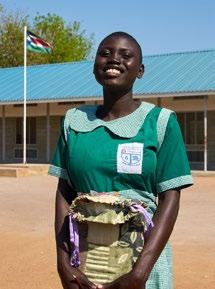
Program and an Associate Professor at Booth University College. Her areas of academic interest include Leadership and Effective Management of not-for-profit organizations and has worked in several senior finance roles throughout her career. Wendi and her husband attend One88 Church in Winnipeg.
NOMINATION COMMITTEE

EWALD UNRUH
MEMBER AT LARGE
(TERM: 2024–2028)
Ewald and his wife Linda have served for many years in church planting and pastoral ministries. After growing up in the Abbotsford area, Ewald studied in Regina (BTh), pastored in two Saskatchewan churches, and then in Halifax. Further studies took place at MB Biblical Seminary in Fresno (M.A). In 1992 Ewald began serving with CCMBC as Director for the Canadian Board of Evangelism, then as Director of Church Ministries and later as Regional Director for C2C Network. Since 2018 Ewald has served with Multiply, more recently as Mission Engagement Coach across Canada, relating primarily to individuals and families,

exploring with them how they can be engaged in mission. Ewald and Linda live in the Winnipeg area, where they enjoy their three married children and nine grandchildren. The Meeting Place is their home church family.
PROVINCIAL REPRESENTATIVES

JOHNNY DODSWORTH MANITOBA
Johnny Dodsworth currently serves as the Discipleship and Life Groups Pastor at Eastview Community Church in Winnipeg, MB. Prior to moving to Winnipeg, he was the Middle School Pastor at North Langley Community Church in Langley, BC. As a provincial representative for Manitoba on the CCMBC Executive Board, he hopes to strengthen the bonds of trust between provincial relationships and work with the other members of the board towards greater unity in our national MB family.
SANDI REUTLINGER
BRITISH COLUMBIA
FRED WEISS
ALBERTA
Send God’s love around the world with school kits
Help pack 24,000 school kits for 24,000 kids this summer. Post your kit packing photos on social media for the chance to win a pizza party! Scan here for details


5 MENNONITE BRETHREN HERALD JUNE | JULY 2024
Rebecca Marial is a school kit recipient in South Sudan.
NATIONAL MINISTRY TEAM UPDATE
In May 2024, the National Ministry Team (NMT) met at Camp Squeah near Hope, BC. This team consists of all provincial and agency leaders and its mandate is to enable collaborative leadership actions among the senior staff of all CCMBC member organizations in implementing the Collaborative Unified Strategic Plan (CUSP). The NMT fosters and models an attitude of collaboration and unity, inspiring and equipping the Conference toward fulfilling its national vision. The team acts as ambassadors for the denomination and its ministry in Canada, subject to the direction of the Executive Board.
During our time together, we had an important conversation about how the team can best collaborate. We clarified the collaborative vision and discussed what it means to network and share resources for collective impact in reaching Canada.
We also processed together this question: What new initiative would equip our churches to become “healthier disciple-making churches”? We prayerfully sensed a need to develop a grassroots prayer initiative. Each provincial leader committed to connecting with some of their pastors, asking them specific questions to help guide the next steps in developing a national prayer movement.


The NMT discussed our desire to create an intentional disciple-making tool to be utilized by pastors and church leaders. Cam Stuart was tasked with developing a basic vision and concept to present to the NMT. The team would then assess, edit and add to this tool as required.
Michael Dick (CCMBC Executive Board Treasurer) facilitated a discussion on our 2025 budgets and provincial contributions to CCMBC. We also heard encouraging reports from Paul Loewen and Phil Gunther regarding the African congregations that are growing in Canada and their desire to work with the MB Conference.
We are also encouraged by the work that has been done by the NMT and Mark Wessner’s team at MB Seminary on Leadership Front Counter. We are still in need of a funding strategy to launch this resource to serve our churches in developing leaders.
Bruce Enns (General Director of Multiply) explained the growing vision of Multiply to focus on various disciple-making initiatives: sending out missionaries, partnering with nationals and helping disciples multiply globally, nationally and through our local churches.
National Ministry Team members (l-r): Reg Toews (British Columbia), Jason Krueger (Legacy CEO), Ken Esau (CCMBC NFLT), Trevor Seath (Ontario), Phil Gunther (Saskatchewan), Jason Dyck (Manitoba), Paul Loewen (Alberta), Cam Stuart (CCMBC) Mark Wessner (MB Seminary), Richard Lougheed (Quebec) and Bruce Enns (Multiply).
CCMBC LEGACY FUND WEBINAR
TUESDAY, JUNE 4, 12 PM PDT
Creating Financial Policies for your Church
Speaker: Jason Krueger, CEO of CCMBC Legacy Fund
No registration required
Click here (or the QR code to the left) for the Zoom link Questions? Contact 1-888-669-6575 or legacy@mbchurches.ca
6 JUNE | JULY 2024 MBHERALD.COM
Fifteen members of the National Faith & Life Team (NFLT) met together from May 12-14 in a camp setting near Hope BC to pray and reflect together how to encourage ever-increasing spiritual health and theological unity within our MB church family across the country. For those unfamiliar with the NFLT (formerly the Board of Faith and Life [BFL]): “The National Faith and Life Team exists to articulate and safeguard Mennonite Brethren theological convictions, produce theological and pastoral resources, and provide discernment and guidance on current issues. The National Faith and Life Team stewards the Confession of Faith on behalf of the Conference.”
The following were some of the meeting highlights over those days:
˚ The NFLT is exploring ways (in collaboration with provincial MB leaders) of enabling and encouraging every MB credentialed leader toward an increasing level of holistic personal health (viz., spiritually, relationally, theologically, physically, etc.). The hope is that these growth steps will lead to an increase in leadership effectiveness, ministry longevity, and healthy churches on mission.
˚ The NFLT has approved in principle a resource entitled: “Loving Well our Trans Neighbours, Friends, and Family” to be made available for
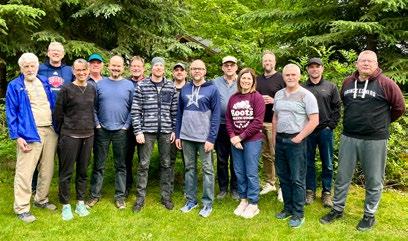
MB churches and leaders in the coming months.
˚ The NFLT is excited about moving forward with plans for Equip 2025 to be held in Winnipeg from October 21 to 23, 2025. More details to follow.
˚ The NFLT is continuing to work on the MB Confession of Faith Resource Update Project and moved forward Article 3: Explanatory Notes, Article 4: Explanatory Notes, and Article 6: Explanatory Notes and Living the Confession (FAQs) to the point where DRAFTS will soon be posted on our CCMBC website inviting further feedback from churches and/or individuals within our family.
˚ The NFLT is also exploring how we can best navigate the diversity that exists within our MB family over whether there should or should not be any leadership limits for gifted women leaders within local MB congregations. Please continue to pray for the National Faith & Life Team members as they work together on the task entrusted to them. It is only by the power of the Holy Spirit, that any of this work will produce good fruit in our churches and lead to the furtherance of God’s Kingdom mission in the world!
Respectfully submitted, Ken Esau (National Faith & Life Director)
National Faith and Life Team members (l-r): Richard Lougheed (Quebec), Ken Esau (Director), Kristal Toews (British Columbia),Paul Loewen (Alberta),Trevor Seath (Ontario), Keith Reed (MB Seminary), Ryan Jantzi (Ontario), Jason Dyck (Manitoba), Walter Fast (Manitoba), Connie Maier (Ontario), Matt Unruh (Ontario), Laurence Hiebert (Alberta), Cam Stuart (CCMBC) and Phil Gunther (Saskatchewan).
MAY 2024 NFLT IN-PERSON MEETING HIGHLIGHTS
7 MENNONITE BRETHREN HERALD JUNE | JULY 2024

AARON BOX NAMED NEXT NATIONAL DIRECTOR OF USMB
USMB has appointed Aaron Box as the new National Director beginning July 1, 2024. Box has served diligently for the last ten plus years, both in his community and on the USMB Leadership Board. Box has also been the senior pastor of North Park Community Church since 2011 and has more than 20 years in ministry leadership.
USMB has outlined Box’s new role as “overseeing the strategic implementation of the three USMB core commitments, working together with congregations, pastors, and leaders around the country to further the conference’s mission of church multiplication, disciple-making, and leadership development.”
Box will be taking over from Don Morris, who has been leading as the National Director of USMB since 2014. Morris will stay on until the end of July to ensure a smooth transition.
“Aaron’s passion for serving others, coupled with his pastoral and leadership experience, make him an ideal candidate to lead our conference forward,” says Boris Borisov, chair of the Leadership Board search committee. “We are confident that under his guidance, the USMB Conference will continue to thrive and proclaim the kingdom of God in communities across the globe.”
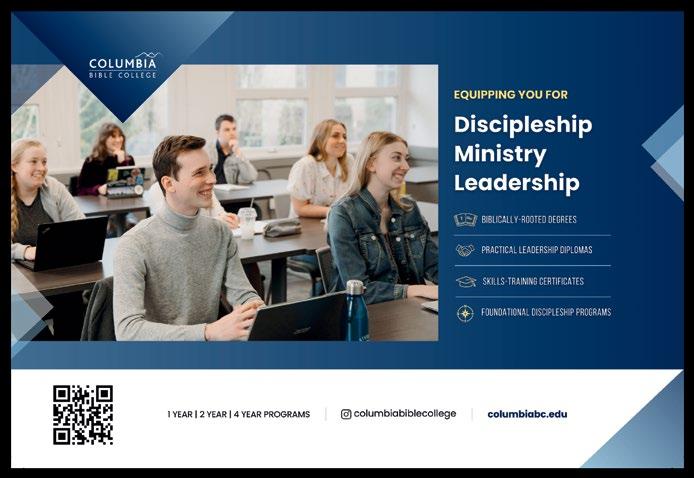
8 JUNE | JULY 2024 MBHERALD.COM
Aaron Box will be taking over from Don Morris as USMB’s National Director on July 1, 2024.
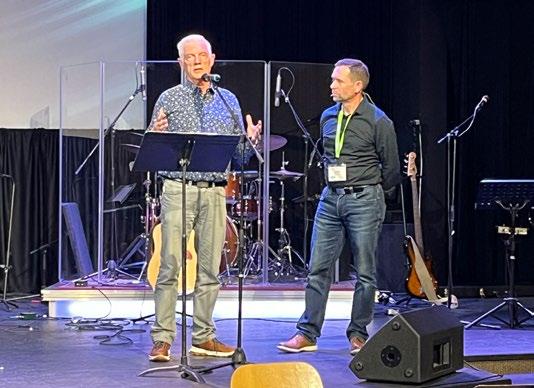
Gathering Around Hope
This year, the ABMB Board strategically separated its AGM and Annual Convention. This allowed for the business portions of our annual meeting to be online so that we could utilize our in-person gathering to intentionally pursue our denominational mission to inspire, equip, and resource ABMB leaders and churches for disciple-making ministry and mission!
During the April 3 online AGM, we welcomed three new members to the Executive Board: Deryle Penner, Barclay Tanner, and Scott Voegtlin. Dele Ajele was also accepted to continue serving a third term. We also welcomed Goshen Church (Edmonton) into ABMB membership and celebrated together that most churches are reporting growth; three churches are even thinking about adding another service to increase capacity.
During our convention weekend (April 12-13) Dr. Steve Brown, Columbia Bible College President, spoke on Friday afternoon about the volatility, uncertainty, complexity and ambiguity we all face in our lives and ministries. He urged us to start deepening our awe of Jesus. Then he
walked us through several practical steps to being leaders in our current culture: being a non-anxious presence, collaborating, and being students of the next generation. National Faith and Life Director Ken Esau spoke on the work that has begun on a communal understanding of how we can love our trans neighbours, friends and family. Friday evening we ate and worshipped together. Worship was led by a team from several different churches; it was a beautiful testament to being one voice as the MB Church in Alberta. Then we heard about God’s good work being done through many partner organizations such as MCC, Multiply, Legacy and Camp Evergreen. Another highlight of the evening was officially welcoming Goshen Church (Edmonton) into ABMB membership. The evening was a time of edification and a reminder of how we can partner together in the mission of God in Alberta and beyond.
Saturday morning opened with a posture of worship. Trevor Rysavy (Associate Pastor at Mission Hill Church in Calgary) spoke on Hope Through Pain and Crisis. Then
ABMB’s Executive Director Paul Loewen with CCMBC National Director, Cam Stuart
ABMB’s Executive Director Paul Loewen’s State of the Province. He expressed concern for many of the happenings in our culture but then pointed to the hope we hold when we know who is in charge. He encouraged us to continue to dive deeper into the mission God has for his churches.
The rest of the morning was dedicated to difficult but helpful conversations about topics such as MAiD, public and Christian schools and the conflict in Israel. This structured space for small group discussions allowed Jesus’ hope to shine where ministry — and life — can feel very dark. After lunch, the afternoon was spent in different workshops led by various pastors and ministry leaders, covering topics such as Youth Ministry as Leadership Development with Dr. Mark Wessner (President of MB Seminary) and Outreaches that Connect with Tim Sesink (Lead Pastor of River West Christian Church in Edmonton).
CCMBC National Director, Dr. Cam Stuart then gave an encouraging word: while burnout in ministry is a reality, God gave us the beautiful gift of Sabbath. We honour the Sabbath by figuring out what is life-giving for each of us as we pray and play, and by allowing this gift to do its transformative work in orienting us to where we are going, where all things are made new.
The weekend ended with sharing in communion and worship. We were encouraged to go out by the grace of God and continue the good work of making disciples.
KENDALL FEENSTRA is the Children’s Pastor at SunWest Church in Calgary, AB. She just completed her term as Secretary on the ABMB Executive Board.
2024 ALBERTA MB CONVENTION
9 MENNONITE BRETHREN HERALD JUNE | JULY 2024
Celebrating growth and praying for new board members
The Quebec churches and partner agencies met on March 23rd, 2024 in St-Laurent. Our small size allowed us to have 100 percent representation: every church had at least one representative present. We heard some news from our partner agencies. It was all very encouraging. Camp Péniel is in a season of extraordinary growth. École de Théologie Évangélique du Québec is being presented with exciting new opportunities. And MCC is active with new initiatives specific to our context.
After this, we celebrated the work of our youth subcommittee that presented new policies to protect our most vulnerable church attendees. We then shared a moment of discussion about the various resources we have in our churches.
Finally, we finished our meeting with the usual presentation of the budget, some minor adjustments to our bylaws and the presentation of our need for new administrators going forward. This last point remains a prayer request — our board is very small and some of our mandates are coming to an end in the near future. After our meeting, we had lunch and enjoyed an enriching time of fellowship.
British Columbia Conference names Reg Toews as new Executive Director.
The British Columbia MB Conference (BCMB) has appointed Reg Toews as its new Executive Director. Toews was commissioned during BCMB’s Convention on Saturday, April 27, 2024. This decision aligns with the recommendations from the spring 2022 Borden report, a key component of BCMB’s pivotal “Way Forward” campaign. This campaign aims to revitalize and reset BCMB’s priorities around its mission, and one of its key recommendations was to hire an executive director, marking a significant change in BCMB’s leadership structure.
Way Forward committee chair Phil Collins identified three factors that gave BCMB a sense of urgency to refocus: being in a season of decline, financial pressures and aging pastoral staff. “We need a fresh vision from the Lord,” said Collins.
One hundred fifty BC pastors participated in the Way Forward survey, facilitated by BCMB Conference Pastor Rob Thiessen. Thiessen will conclude his service with BCMB in 2024 after 12 years in the role. Sharon Simpson, a former board moderator, praised Thiessen, stating, “Rob has faithfully served our churches daily.”
The 2024 convention theme, “Whatever Happens,” was based on Philippians 1:27: “Whatever happens, conduct yourselves in a manner worthy of the gospel of Christ. Then, whether I come and see you or only hear about you in my absence, I will know that you stand firm in the one Spirit, striving together as one for the faith of the gospel.”
Thiessen urged churches to “contend for the faith and the gospel. And to stand together in the coming storm.”
Brett Landry, Andrew Katay, and Jamie Bester from City to City, an organization specializing in church planting and revitalization, led an equipping day on Friday afternoon. At the time of writing, 15 BCMB churches have expressed interest in City to City church revitalization as part of a beta program led by the conference.
During his first address as Executive Director, Reg Toews gave a brief overview of his past service, his experience in church planting, and his passion for sharing the gospel with those who are lost. Drawing inspiration from Isaiah 43:19, he emphasized the importance of trying new things and following God’s guidance. Reg stated that he approached his new role with fear, humility, and courage, acknowledging that they could not succeed without God’s help. He also emphasized the significance of prayer and requested that the BCMB church family pray for him and the organization. He even asked attendees to set a daily prayer reminder on their devices.
— MB Herald staff
2024 AEFMQ CONVENTION
2024 BCMB CONVENTION
10 JUNE | JULY 2024 MBHERALD.COM
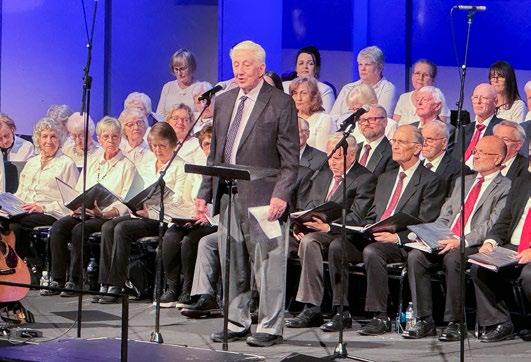
Fraser
Valley Festival of Praise is proof that we never retire from God’s ministry
Herb Neufeld is part of a group he calls “the retired ministry leaders and spouses gathering” that brings together 60-70 retirees to share in fellowship over a devotional, a meal, and a musical performance. It sounds like a pretty nice way to enjoy retirement but the more we talk with Neufeld, the less this group sounds like they are partaking in “retirement”.
Neufeld, along with John H. Redekop recently chaired the planning committee of the Fraser Valley Festival of Praise, which brought 2000 people together over three performances to raise a quarter of a million dollars in support of Ukranian refugees. Putting together an event of that size and impact is no walk in the park.
“It seemed only evident that with the new challenges that the present war in Ukraine and Russia has generated that we should do something to help them.” Neufeld shared. “I threw the idea out just as a little dream, a little thought, and our committee embraced it.”
What started with a small team of Neufeld and Redekop, along with Redekop’s wife, quickly turned into a
community effort to put on this event. Neufeld talked about a desire from the community to hear older songs and hymns we don’t hear in our churches much these days. So, he used this as a launching point for the event and reached out to Fred Ekkert, who leads the Clearbrook MB Church choir. Ekkert agreed to lead the choir and many of the choir members were excited to take part, but not everyone had the exuberant energy levels Neufeld was running on.
“Something we underestimated, which we shouldn’t have…being of the same age, was that the program schedule we planned was very intense.” Neufeld explained further that the Saturday was at least an eight hour day of travelling, rehearsing, and performing for many of the choir members.
Once the choir was secured, the planning committee decided they wanted the concerts to be free to anyone who wanted to attend. The generosity of the community had the first $30,000 raised within a few weeks, and in the months to follow another $100,000 was raised before the event even happened.
The three concerts themselves brought in over $100,000 in donations, bringing the grand total to $250,000. After covering the costs of the event, the funds will be divided roughly 50/50 between ministry efforts in the Fraser Valley and ministry efforts in Ukraine. MCC graciously volunteered to help administer the funds on the ground in Ukraine.
On top of the choir performances, the program included four powerful video testimonies from Ukrainians who had fled to Canada during the war in the 1940’s.
“We have been blessed as a result of the hardships they went through when they came out of the revolution and war as immigrants. They learned a new language, were able to etch out a living on the prairies, and most of them started as farmers,” said Neufeld. “It’s amazing how Mennonites have prospered and are now involved in almost every profession in significant ways.”
This event will have a great impact on those affected by the war in Ukraine and Russia, and it will leave a lasting impact on the 2000 people that took part in the Festival of Praise. And it all goes to show, you are never a retiree of the plans God has for your life.
“Great is the LORD and most worthy of praise.... One generation will commend your works to another; they will tell of your mighty acts” (Psalm 145:3-4).
If you would like to contribute to ministry efforts among Ukrainian refugees in the Fraser Valley and for people in Ukraine, visit mcc.org and select “BC Festival of Praise” as your choice of support.
11 MENNONITE BRETHREN HERALD JUNE | JULY 2024
Herb Neufeld and the Festival of Praise choir
Q&R corner
Q&R corner provides responses to questions that readers may have about CCMBC and its work collaborating with provincial MB conferences in areas of spiritual health and theology, leadership development, mission, and organizational health in order to achieve the overall mission: “To cultivate a community and culture of healthy disciple-making churches and ministries, faithfully joining Jesus in his mission.” If you would like to contribute a question, please send it to questions@mbchurches.ca
Please note that we will not be using your name in the MB Herald Digest in order to respect those who prefer anonymity. There may not be space to respond to every question—and sometimes we might not really have the ability or authority to respond to some questions (for example, those that relate more directly to one of our provincial MB conferences or to a local church leadership). We apologize in advance if we are unable to publish a response to your specific question.
“My family has practiced both bodily and cremation burials which we felt were both God honouring and a testimony to the gospel. I have been curious about the teachings of the Scriptures in this area of end-of-life burial for believers. Also, what has been the teaching of the MB Church?”
P.
Thanks, P., for this important question that is becoming more relevant with the explosion in popularity for cremation in Canada which now sits at about 75 percent for all deaths.1 For our MB family, the choice between burial and cremation is a “non-confessional issue” which means that it is not at a level of something being “right” and the other choice “wrong” (or one choice being “sinful”). Instead this is a wisdom and a witness question. It is in that tone of humble investigation that I will try to engage the question. As believers, if we hope to be both God honouring and live out a testimony to the gospel, we will want to ask the following:
˚ How do burial and cremation witness to our convictions related to death and the afterlife?
˚ How do burial and cremation align with our
1 See Statista, “Cremation Rate in Canada From 2000 to 2022, With a Forecast for 2027.” Available: https://www.statista.com/ statistics/916310/cremation-rate-in-canada/
convictions about creation care?
˚ How do burial and cremation align with our convictions about simple living and good stewardship?
˚ How do burial and cremation align with our desire to bring comfort to people experiencing grief?
When it comes to our theological convictions about death and the afterlife, we can look to our MB Confession Article 18: Christ’s Final Triumph to see a summary of what MBs believe the Bible teaches: Since Christ destroyed the power of death by His resurrection, believers need not be afraid of death, the last enemy. Christ’s followers go to be with the Lord when they die. When Christ returns, they will be raised and receive new bodies. Believers who are alive at Christ’s coming will be transformed and will also receive new and glorious bodies, fit for life in God’s eternal kingdom. This paragraph describes how for disciples of Jesus who have passed away, our eternal future is a twostep process. The first is that at death, believers leave their bodies and are “with” or “in” Christ (1 Thess 4:16;
12 JUNE | JULY 2024 MBHERALD.COM
1 Cor 15:18). Death cannot separate us from the “love of God that is in Christ Jesus our Lord” (Rom 8:38-39). While being “with” or “in” Christ does suggest that our disembodied selves are in “heaven” since that is where Christ’s throne is, this is NOT our final dwelling place. This is appropriately called the “in-between” or the “intermediate” state. Since the Bible provide few details about this state, we should be very cautious about saying more than the Bible says. 2 But whatever we say, we must proclaim that this in-between state (as disembodied spiritual beings) is not our eternal home.
The next and final stage is when Jesus returns to earth in triumph. At this point, according to 1 Thessalonians 4:13-18, the “dead in Christ” will “rise first” which seems to mean that all believers in the in-between state will return to earth to be reunited with their newly resurrected and now incorruptible bodies to “be with the Lord forever.” This actual physical but incorruptible body coming out of the grave is what the expression “resurrection of the dead” (Luke 20:35-36; Acts 4:2; cf. Matt 22:31) means. Jesus’s resurrection body was physical, spiritual, and incorruptible and Christians are promised that we will follow Jesus who is the “firstfruits of those who have fallen asleep” (1 Cor 15:20). Jesus’ resurrection is the firstfruits that gives us confidence that we will rise just like him out of the grave (cf. v.23). Bodily resurrection when Jesus returns is our fundamental and central hope because it is with a newly resurrected body like this that believers will live in the new earth promised in Revelation 21. Bodily resurrection tells us that our our body matters since it (along with our soul, mind, and spirt) will play a part in the gospel story for eternity.
So back to our question — how do burial and cremation witness to our convictions related to death and the afterlife? We must begin with our confidence that no matter what happens to our physical bodies when we die, this will not stop any believer from experiencing bodily resurrection at the return of Jesus. Disciples of Jesus who passed away in the last 2,000 years no matter how they died or what was done to their physical remains, will be resurrected at the return of Jesus. But, because of a strong belief in the resurrection of the physical body, until very recently Christians all over the world have unilaterally been committed to the burial of the body as the best expression of our convictions related to death and the afterlife. Christians in India, for example, who come out of cremation faiths, have embraced burial in order to better communicate their new resurrection hope. It is only
2 For a description of the Bible and the “intermediate state,” see Michael Bird, “The Intermediate State: What the Bible Tells Us.”
Available: https://zondervanacademic.com/blog/intermediate-state
“Those Jesus disciples today who choose cremation will find God taking those ashes and miraculously recreating them into a resurrection body.
recently that Christians have abandoned this universal practice in favour of cremation. 3
It must be emphasized that cremation as a Christian option does NOT change the eternal destiny of a believer. Those Jesus disciples today who choose cremation will find God taking those ashes and miraculously recreating them into a resurrection body — just as God will take all burial remains in whatever state they are presently in and miraculously transform them and infuse them with the soul, spirit, and mind of the departed believer. The only question is whether cremation is the best vehicle to communicate to the world our resurrection hope and belief that at the funeral of a believer in Jesus, we are looking forward to not one but two stages in their future journey — and the final stage involves a resurrected physical but incorruptible body to live in the physical but incorruptible new creation.
When it comes to how burial and cremation fit into our convictions related to creation care, this is a bit of a complicated question. There is no question that putting embalmed bodies in varnished wood and/or metal caskets and lowering them into cement or plastic vaults in fields of prime agricultural land is not a long-term environmentally friendly and sustainable approach.
Cremation involves temperatures between 1,200 and 2,000 F (649-1093 C) and a carbon production of about 535 lbs of CO2.4 In addition, there can be emissions from mercury dental fillings that may or may not be scrubbed from the air at the crematorium. While cremation at its best is definitely better environmentally than burial at its worst, both options are less than ideal and both practices need improvements to be
3 For more on this, see Justin Dillehay, “Cremation or Burial: Does Our Choice Matter?” Available: https://www.thegospelcoalition.org/ article/cremation-burial-choice/
4 See Tom Harries, “Is Cremation Bad for the Environment?” Available: https://earthfuneral.com/resources/is-cremation-badfor-environment/
SPIRITUAL HEALTH AND THEOLOGY
” 13 MENNONITE BRETHREN HERALD JUNE | JULY 2024
sustainable. There are possible ways to significantly lower the environmental impact of burials and cremations to the point where they are both almost negligible, but we would need to truly want to do this. Burials would need to no longer involve embalming, elaborate caskets, cement/plastic vaults, and prime land. Cremations would need to be replaced by new processes (viz., resomation [sometimes called water cremation] or cryomation [which involves freezing the body with liquid nitrogen]) that significantly reduce carbon emissions.5
Research has shown that the greatest environmental impact in terms of CO2 emissions is not from either burial or cremation but from the funeral service itself with all the guest travel, flower delivery, and so on.6 If creation care is our primary criterion, it might be less about burial or cremation, but about moving to online funerals for most of our friends and family.
When it comes to our convictions about simple living and good stewardship, how do burial and cremation compare? An obvious concern here is the high cost of burial practices today which involve embalming, expensive caskets, extra funeral home services, cemetery plots, and cemetery markers. Picking up an urn of ashes from the funeral home and placing the ashes on one’s mantle or spreading them by one’s
5 See E.E. Keizer and H.J.G Kok, “Environmental Impact of Different Funeral Technologies.” Available: https://www.funeralnatural.net/ sites/default/files/articulo/archivo/environmental_impact_of_ different_funeral_technologies.pdf
6 See Jennifer Carubia, “Sustainable End-of-life Arrangements: An Overview.” Available: https://libjournals.unca.edu/ncur/wp-content/ uploads/2021/09/360-Carubia.pdf
favourite tree or stream obviously reduces these costs significantly. Making more simple choices in terms of burial costs could lessen the disparity here but is unlikely to eliminate it. While simple living and good stewardship is an obvious value for us, choosing cremation out of a desire to save money should not be our primary consideration unless we can also argue for cremation’s positive fit with our other convictions.
Finally, when it comes to our desire to bring comfort to people experiencing grief, this is a very personal and individual-specific question. For some, putting flowers onto a casket and lowering it into the ground is a very dignified and respectful process. In addition, having a gravesite with a marker to visit and putting flowers beside it can be a great comfort in the ongoing grieving process. For others, having an urn of ashes and bringing it home or spreading the ashes somewhere special for the family can also bring great comfort. When it comes to comforting people in grief, I don’t think one process is clearly better than the other.
To conclude, I thank you for your question and your desire to do what is both “God honouring and a testimony to the gospel.” I believe that your question is something that we should continue to talk about and explore as an MB family. However, it might be most significant for us to clarify our theological convictions about the two stages that are part of what Christians can look forward to after physical death. Only then can we have productive discussions about what is truly God honouring and a testimony to the gospel.
Thanks again! Blessings and Shalom in Jesus!
Ken


SPIRITUAL HEALTH AND THEOLOGY
14 JUNE | JULY 2024 MBHERALD.COM
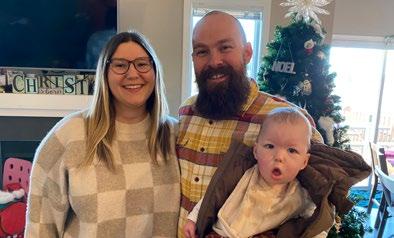
PRAYING FOR A MIRACLE
HOLLY HANNIGAN
The birth of a child is a miracle. It was a miracle the day Jesus was born and it is a miracle today with each and every child entering this world. I recently returned to work after having my first baby, but let me tell you—it felt nothing like a miracle.
I had a typical pregnancy and a somewhat complicated birth, but at the end of the day my son was born, appearing healthy. In the following days we would learn that he was far from it. He couldn’t eat, slept nearly all day, and spent his waking moments writhing in pain.
I won’t get into the lengthy details of those days, or the months and months that followed, but after a long NICU stay we eventually learned that our infant son was born with a genetic disorder that would shape his life, as well as ours.
Nemaline Myopathy is an ultra-rare condition that causes the muscles throughout the body to be very weak. My son, Callum, spent nine months in hospital, is fed through a feeding tube, cannot walk or crawl, and relies on a number of medical devices on a daily basis. There is no treatment and no cure. The goal for this condition is to try to prevent the worsening of symptoms as kids age through medications, surgeries, and therapies.
I spent many tearful days praying for miraculous healing for my son. I prayed he would breathe on his own, be able to eat and learn to walk and play like any other kid. I liked to think that if I prayed enough and truly believed in the miracle, God would remove us from this suffering.
But that’s really not how miracles work.
When I became too tired to pray, I would weep over my child and sit in God’s presence, believing he would know my prayer without me having to say a word. And in the silence God’s voice said, “My child, the miracle has already happened. I have blessed you with a son and I will move mountains through him.”
I wanted my miracle, but God had already performed his. With that answer, my prayers changed. “Lord, please give me the strength to be the mom my
son needs. Lord, surround me with a community that understands this experience. Lord, please have mercy on me when I doubt your goodness in this story. Lord, thank you for the miracles you have performed and the miracles yet to come.”
And God blessed our family over and over. He changed my perspective of parenting. He introduced me to a group of medical moms who would be the greatest support I could ask for. He covered me in grace and mercy and love on the hardest days. And he helped me to see his miraculous hands working in Callum’s everyday life.
God’s miracles aren’t about us. They aren’t about avoiding suffering, and they aren’t even about physical healing. The purpose of God’s miracles is to glorify him and to free us to accept salvation.
The Bible is full of miracles and often those miracles involve physical healing. But Jesus didn’t heal these people simply to remove their earthly suffering. Jesus first, and most importantly, heals us spiritually by forgiving our sins and pointing us to God.
We see this in Matthew 9, when Jesus heals a paralyzed man. He first says to the man, “Take heart, son; your sins are forgiven.” And when the teachers questioned God’s authority, Jesus responded, “Which is easier: to say, ‘Your sins are forgiven,’ or to say, ‘Get up and walk’? But I want you to know that the Son of Man has authority on earth to forgive sins” (Matt. 9:1-8).
Callum does not need to be miraculously healed to be used by God. His disability has given me a new heart and fresh eyes. I have a peace that I have never before had, that can only come from our God above. It’s a peace that others notice. When people ask how I remain so calm and encouraging when faced with these trials, I can only point to him. Our God of miracles.
HOLLY HANNIGAN is the Communications and Content Management Coordinator for CCMBC and the Communications and Content Manager for MBCM.
15 MENNONITE BRETHREN HERALD JUNE | JULY 2024
2024
MONTHLY PRAYER FOCUS
Intercession Prayer (Part 1)
“For this reason, since the day we heard about you, we have not stopped praying for you. We continually ask God to fill you with the knowledge of his will through all the wisdom and understanding that the Spirit gives, so that you may live a life worthy of the Lord and please him in every way: bearing fruit in every good work, growing in the knowledge of God, being strengthened with all power according to his glorious might so that you may have great endurance and patience, and giving joyful thanks to the Father, who has qualified you to share in the inheritance of his holy people in the kingdom of light.” (Col 1:9-12)
“I urge, then, first of all, that petitions, prayers, intercession and thanksgiving be made for all people—for kings and all those in authority, that we may live peaceful and quiet lives in all godliness and holiness. This is good, and pleases God our Savior, who wants all people to be saved and to come to a knowledge of the truth.” (1 Tim 2:1-4)
“Is anyone among you sick? Let them call the elders of the church to pray over them and anoint them with oil in the name of the Lord. And the prayer offered in faith will make the sick person well; the Lord will raise them up. If they have sinned, they will be forgiven. Therefore confess your sins to each other and pray for each other so that you may be healed. The prayer of a righteous person is powerful and effective.” (Jas 5:14-16)
“Brothers and sisters, my heart’s desire and prayer to God for the Israelites is that they may be saved.” (Rom 10:1)
REFLECTIONS:
Our June 2024 Contending in Prayer Guide is focused on Intercession Prayer where we specifically pray not for ourselves but for others. Intercession prayer involves asking God to actively do something that we hope for and believe is best for those we are praying for. Intercession prayer raises many questions about how God’s amazing sovereignty over history makes space for our feeble prayers where we “do not know what we ought to pray for, but the Spirit himself intercedes for us through wordless groans” (Rom 8:26). Philip Yancey’s provocative book title Prayer: Does it Make Any Difference? gets at a key question that all believers must wrestle with.
There are at least two possible answers to the question whether intercessory prayer makes a difference. The first is that prayer changes the one praying. Soren Kierkegaard is famously quoted as saying: “A man prayed and at first he thought that prayer was talking. But he became quieter and quieter until, in the end he realized prayer is listening.” Praying prayers of intercession can lead us to greater openness so the Holy Spirit changes our hearts and prompts us to participate with God toward the fulfillment of the very prayers we pray. The Spirit may prompt us to visit the lonely person we prayed would be relieved of their loneliness; to share resources with the poor person we prayed would have food or money for rent; or to share Jesus with the spiritually lost person we prayed would hear the gospel story.
JUNE CONTENDING IN PRAYER
SPIRITUAL HEALTH AND THEOLOGY
16 JUNE | JULY 2024 MBHERALD.COM
But changing the person praying cannot be the totality of intercession prayer since this would limit prayer to a very small circle of impact. We are told by Paul to pray “intercession and thanksgiving [for] all people—for kings and all those in authority” (1 Tim 2:1-2). We want to pray for Christians facing persecution halfway across the globe and for people far from us living through war and environmental disasters. While we may have some ability to impact these situations by donating money or even serving through Multiply, MDS, MCC, etc., we believe that God is doing something for the recipient of the prayer far above the ability of the person praying to do anything to assist in the fulfillment of the prayer.
This second response then is that God does new things in response to the prayers of believers across the globe—but it is difficult to explain the mysterious ways God interacts with those prayers. It is clear that our prayers (no matter how coordinated and filled with faith) do not force God to do things that conflict with God’s ultimate will and character. Unlike the TV evangelist who sent me endless testimonies of people receiving economic and physical blessings in response to his prayers for them (as long as they sent their “best gift” to God with the TV evangelist’s ministry name on the cheque of course), our prayers are not somehow magical and manipulative or else we ultimately become gods ourselves and the Triune God our servant. We must pray in faith but also in a posture of worship, surrender, and submission to the ultimate will of God in the world.
Even though we cannot adequately explain how prayer “works,” we commit ourselves to pray because we want to follow in the footsteps of Jesus (cf. John 17), obey the New Testament writers when they command us to pray (1 Tim 2:1-4; Jas 5:14-16), and join the long history of faithful praying believers who have gone before us. Intercessory prayer must be a key part of our prayer lives.
Here in our June prayer column, we are focusing specifically on the kind of intercession prayer that asks that people would come to a healed, restored, and reconciled relationship with God through Jesus. This kind of intercession prayer must grow out of a deep sense of love and compassion—knowing that this is also God’s very heart for the whole world (John 3:16). We intercede because we want all people to experience the fullness of God’s salvation and the true life that results from it—knowing that our God “wants all people to be saved and to come to a knowledge of the truth” (1 Tim 2:4).
When we pray for people to come to know Jesus,
we do not know exactly how God answers this sort of prayer. While God has “hardened” people’s hearts in history (cf. Exod 4:21; John 12:39-40), God can also “soften” people’s hearts (Jer 24:7; Ezek 36:26). While we are praying for people’s hearts to be softened toward Jesus, there is a mystery here between God’s ultimate control/sovereignty and God’s gentle and noncoercive gospel invitation to each human image bearer (Rev 3:20). But we pray into that mystery with faith, hope, and trust in the God who holds the future.
So we pray for those in our families who are not followers of Jesus that they may respond to Jesus and experience the salvation and life that Jesus offers. We pray also for friends and neighbours, for political leaders and social influencers, and for enemies and those presently living out hostility to us and/or the gospel.
Prayer for people to be reconciled with God is our most fundamental intercession prayer. All other types of intercession prayers are subordinate to this type of intercession because we believe that it is in responding to the gospel that everything changes—“the new creation has come. The old has gone, the new is here!” (2 Cor 5:17). People who respond to the gospel become children of God, citizens of the Kingdom, and members of the body of Christ. This kind of intercession prayer is certainly Kingdom prayer!
CONSIDER:
˚ Who do you know (family, friends, neighbours) that is living a life without forgiveness and salvation through Jesus? (You may want to make a list of these individuals so that you can more effectively pray for them.)
˚ As you pray, is there a way for you to be part of the answer to this prayer for each person you are thinking of—gently, winsomely, and non-coercively encouraging them to consider the reality and claims of Jesus?
INTERCESSION PRAYER: PRAYING IN RESPONSE TO ROMANS 10:9-15 Romans 10:9-15 declares truths that are behind our intercession prayers for reconciliation with God. Read this section of the biblical text in italics and then add your own prayers for people you know who do not seem to have experienced what the text talks about. After you have prayed these prayers of intercession, be attentive to God’s Spirit through the next hours and days. God may be speaking to you about how you can participate in the prayer that people would respond to Jesus in faith.
SPIRITUAL HEALTH AND THEOLOGY
17 MENNONITE BRETHREN HERALD JUNE | JULY 2024
PRAY THESE WORDS OUT LOUD:
If you declare with your mouth, “Jesus is Lord,” and believe in your heart that God raised him from the dead, you will be saved. For it is with your heart that you believe and are justified, and it is with your mouth that you profess your faith and are saved. As Scripture says, “Anyone who believes in him will never be put to shame.” For there is no difference between Jew and Gentile—the same Lord is Lord of all and richly blesses all who call on him, for, “Everyone who calls on the name of the Lord will be saved.”
How, then, can they call on the one they have not believed in? And how can they believe in the one of whom they have not heard? And how can they hear without someone preaching to them? And how can anyone preach unless they are sent? As it is written: “How beautiful are the feet of those who bring good news!”
God, I pray now that you would soften the hearts of the following people whom I believe are in need of your great salvation. I pray that your Holy Spirit would soften their hearts and straighten out the thoughts of their minds so that they would indeed declare that you are Lord, believe and be justified, and become followers of you. I give all the glory to you for what you are doing and will do for each of these people.
I pray specifically for (speak out each person’s name)
I also pray that you would reveal to me what I can do to bless, encourage, and invite these individuals to you. May I be receptive to the opportunities you bring my way. May I live in a way that draws others to you and your salvation.
May your Kingdom come to earth as it is in heaven. Amen!
(Ken Esau, National Faith & Life Director)
SPIRITUAL HEALTH AND THEOLOGY 18 JUNE | JULY 2024 MBHERALD.COM
Intercession Prayer (Part 2)
“For he himself is our peace, who has made the two groups one and has destroyed the barrier, the dividing wall of hostility, by setting aside in his flesh the law with its commands and regulations. His purpose was to create in himself one new humanity out of the two, thus making peace, and in one body to reconcile both of them to God through the cross, by which he put to death their hostility. He came and preached peace to you who were far away and peace to those who were near.” (Eph 2:14-17)
“Love must be sincere. Hate what is evil; cling to what is good. Be devoted to one another in love. Honor one another above yourselves…. Be joyful in hope, patient in affliction, faithful in prayer. Share with the Lord’s people who are in need. Practice hospitality. Bless those who persecute you; bless and do not curse. Rejoice with those who rejoice; mourn with those who mourn. Live in harmony with one another. Do not be proud, but be willing to associate with people of low position. Do not be conceited. Do not repay anyone evil for evil. Be careful to do what is right in the eyes of everyone. If it is possible, as far as it depends on you, live at peace with everyone. Do not take revenge, my dear friends, but leave room for God’s wrath, for it is written: “It is mine to avenge; I will repay,” says the Lord. On the contrary: ‘If your enemy is hungry, feed him; if he is thirsty, give him something to drink. In doing this, you will heap burning coals on his head.’ Do not be overcome by evil, but overcome evil with good.” (Rom 12:9-21)
REFLECTIONS:
Our July 2024 Contending in Prayer Guide is focused on Intercession Prayer (Part 2) where we specifically pray for the ending of hostility, violence, and hatred — and the restoration of healthy human relationships in the direction of God’s shalom. God’s Kingdom begins with people having a reconciled, healthy, and restored relationship with God (see June 2024 Prayer Guide), which then spills over to reconciled, healthy, and restored relationships with others, creation, and even with their own selves. The June 2024 prayer guide focused on intercession prayers for people to have a restored relationship with God, so now in July we are focusing on prayers for healed and restored relationships with others.
The Bible describes the reality of our world where sin fractures interpersonal relationships and these fractures spread like cancer until they show their full death-producing fruit with Cain killing Abel, the sons of God “taking” (or stealing) the daughters of men, violence spreading across the land, and even with a father cursing his own son (see Gen 4-11). These death-producing actions continue to repeat themselves over and over through each successive generation, but the good news is that Sin’s power has been defeated conclusively through Jesus
and all Sin’s effects will be healed fully and eternally at Jesus’s return.
So when we pray intercession prayers for the healing of fractured human relationships, we are praying for this future healing of sin’s effects to become a present reality now in our lived experience. We are praying out the meaning of the Lord’s prayer — calling for God’s kingdom to come to earth as it is in heaven (Matt 6:10).
We are praying intercession prayers for the restoration of broken and fractured human relationships — between husbands and wives, between parents and children, between siblings, between neighbours, between business partners, between churches and people within those churches, between ethnic and economic communities, and between nations. The cancer of broken relationships has spread everywhere so God’s healing work is desperately needed everywhere. So we pray intercessory prayers for restoration, healing, and a peace that changes everything.
As noted in our June prayer column, sometimes our prayers can be partially answered by God’s Spirit working in us, prompting us to become agents of interpersonal reconciliation between ourselves and others — or even to stand in the gap and be blessed
SPIRITUAL HEALTH AND THEOLOGY JULY CONTENDING IN PRAYER
19 MENNONITE BRETHREN HERALD JUNE | JULY 2024
peacemakers (Matt 5:9) bringing together hostile people in conflict and encouraging them toward healing, forgiveness, and reconciliation. As we pray prayers of intercession, we must be open to listen to the Spirit and ask: “What are you calling me to do in this situation?”
But as we pray for our own relationships and for people mired in conflict and war all over the world, we pray for God’s miracles so that our hearts and the hearts of all humans would move from hatred to love, from hostility to understanding, and from violence to true forgiveness.
It may seem hopeless to pray for those in wartorn situations, for people seemingly bent on imposing their evil plans upon others — but we pray with hope knowing that “the one who is in [us] is greater than the one who is in the world” (1 John 4:4). We pray because we know that one day, nations will “beat their swords into plowshares and their spears into pruning hooks. Nation will not take up sword against nation, nor will they train for war anymore” (Is 2:4).
This kind of intercession prayer is certainly Kingdom prayer!
CONSIDER:
˚ Are there relationships of hostility and conflict that exist in your own life? (You may want to make a list of these individuals so that you can bring these to Jesus in prayer.)
˚ What other relationships of hostility and conflict are you feeling called to pray into?
(Although you may not be directly party to these relationships, make a list of these situations as well.)
INTERCESSION PRAYER: PRAYING IN RESPONSE TO ROMANS 12:9-21.
Romans 12:9-21 declares truths that are behind our intercession prayers for interpersonal reconciliation with others. Read this section of the biblical text in italics and then add your own prayer for conflict situations that need healing and restoration through Jesus. After you have prayed these prayers of intercession, be attentive to God’s Spirit through the next hours and days. God may be speaking to you about how you can participate in these prayers for reconciliation and restoration.
PRAY THESE WORDS OUT LOUD:
Love must be sincere. Hate what is evil; cling to what is good. Be devoted to one another in love. Honor one another above yourselves…. Be joyful in hope, patient in affliction, faithful in prayer. Share with the Lord’s people who are in need. Practice hospitality. Bless those who persecute you; bless and do not curse. Rejoice with those who rejoice; mourn with those who mourn. Live in harmony with one another. Do not be proud, but be willing to associate with people of low position. Do not be conceited. Do not repay anyone evil for evil. Be careful to do what is right in the eyes of everyone. If it is possible, as far as it depends on you, live at peace with everyone. Do not take revenge, my dear friends, but leave room for God’s wrath, for it is written: “It is mine to avenge; I will repay,” says the Lord. On the contrary: ‘If your enemy is hungry, feed him; if he is thirsty, give him something to drink. In doing this, you will heap burning coals on his head.’ Do not be overcome by evil, but overcome evil with good.”
I pray specifically for a conflict situation that I have with I pray that I would be obedient to your Spirit and do what you are calling me to do — so, as much as I am able, I can “live at peace with everyone.”
I pray specifically for these other conflict situations that I am aware of:
May your Spirit work in these people’s hearts and move them to be open to reconciliation and forgiveness in the relationship — but most of all, we pray that, if they do not know you, that they would be respond to become disciples of Jesus living out the peace of Jesus.
May your Kingdom come to earth as it is in heaven. Amen!
(Ken Esau, National Faith & Life Director)
SPIRITUAL HEALTH AND THEOLOGY 20 JUNE | JULY 2024 MBHERALD.COM
BY JACQUIE AND RICK BLOCK
ave you ever had a mentor? Have you been a mentor to someone? If yes, what impact did it make in your life? If no, we ask the same question — how do you think a lack of mentorship has impacted your spiritual journey?
HRick and I have experienced both formal and informal mentoring as a pathway for growth and discipleship. These relationships reinforce our conviction that we need one another in the body of Christ. Mentoring has kept us humble and dependent on God and his Word; receiving wise counsel has been invaluable in deepening our relationship with Christ and discerning our own paths.
There are many biblical examples of mentorship: Moses and Joshua and Elizabeth and Mary are two that come to mind. It seems God regards mentoring as a worthy investment. Interestingly, the pastoral application of our MB Confession of Faith states: “Discipleship happens when mature Christians walk with younger believers in their spiritual journey.” One could ask the question, does discipleship even happen without mentoring?
While at times church programs can help facilitate formal mentoring relationships, in our experience we have found that most mentoring opportunities begin quite informally, or even stay that way. Formal language and titles such as mentor and mentee can be a barrier to many who feel unqualified for the role. Our best advice is to be open to the people God brings your way, be willing to invest in others (even if they seem indifferent), be prepared to learn from one another, seek out people who you see as role models — and don’t be afraid to be a role model yourself!
For more helpful tips on mentorship, we suggest Mentoring Matters. (This booklet is an updated version of a Ministry Quest pamphlet published together with CCMBC and MB Seminary.)
On the back of Mentoring Matters, it says: “Good mentoring is not about having all the right answers, it is about asking the right kind of questions.” Mentors don’t need to be skilled teachers or
pastors, nor feel like they have all the “right” answers; when mentors fall into this way of thinking, it may prevent them from mentoring well.
In Colossians 2:6-7, Paul writes: “So then, just as you received Christ Jesus as Lord, continue to live your lives in him, rooted and built up in him, strengthened in the faith as you were taught, and overflowing with thankfulness.”
These verses offer a clear outcome for a mentoring relationship — to help others grow in their capacity to be rooted and built up in Christ. They also provide us with two metaphors on how to journey with others: being a gardener (“rooted’), and being a builder (“built up”). Interestingly, Paul also uses the same language in 1 Corinthians 3:6-11. When we look at the larger context of these Corinthian verses, we also see that Christ is our solid foundation and that God helps all things grow.
“ROOTED”: MENTORS AS GARDENERS
Even though I (Rick) grew up on an acreage with a large garden, I never thought gardening would become such a passion, a part of my vocation, and an important metaphor by which I engage with Scripture. Gardening and mentoring have, at their core, a
21 MENNONITE BRETHREN HERALD JUNE | JULY 2024
stewardship ethic that seeks growth, beauty, and nourishment — with the hope of providing goodness (fruit) over the long term.
Gardening literally begins from the ground up; caring for the soil is the starting point to a sustained life of fruitfulness. In this metaphor, soil represents the capacity of the heart to receive and give love. A heart that is rich and deep demonstrates a willingness to absorb and transform the conflicts and losses we experience in life (i.e. the complex “organic” matter) into a form of nutrition that produces a 30-, 60- or 100-fold yield.
But being fruitful is not guaranteed—it requires knowledge and skill in understanding and guiding growth and maturation. When the mentor-gardener remains diligent in watching for signs of progress and/or vulnerabilities, he or she can offer wisdom to allow God to prune areas of the mentee’s life and encourage the mentee to abide in Christ so that his or her life can bear much fruit.
Gardening can also be a way to express beauty and harmony. Mentoring is a practice that can significantly enhance the well-being of a community of people. Just as well-tended gardens and fields contribute to a healthy landscape, so too is the effect of Christ-followers committed to living in community through the gift of God’s Spirit. For the mentor-gardener, it is both humbling and exciting that the Master Gardener, in his wisdom, has invited his apprentices into this magnificent work!
“BUILT UP”: MENTORS AS BUILDERS
I (Jacquie) have always been intrigued by how homes are designed and built — in my early 20s, I spent a couple of years studying civil engineering. One of the things I learned during that time is that all structures need a solid foundation; but to finish a project, a lot more needs to be done!
Colossians 2:6 tells us that we need to be built up in Christ. Interestingly, the Spanish verb for “to build” is edificar. This word , which has an obvious connection to the word edify — meaning to uplift, instruct or even to construct — offers helpful imagery for a mentoring relationship. Any construction project needs a good foreman, an experienced person who can watch over the work of another, while everyone follows a common blueprint (God’s Word). But a foreman isn’t going to help someone else learn to build by doing all the work.
Likewise, a mentor can offer supportive words through good questions and wise counsel, but they also need to allow the mentee to learn their own skills and develop their own ways of working. As it says in 1 Corinthians 3:9 (ESV), “For we are God’s fellow workers. You are God’s field, God’s building.”


MOST MENTORING
OPPORTUNITIES BEGIN QUITE INFORMALLY, OR EVEN STAY THAT WAY. FORMAL LANGUAGE AND TITLES SUCH AS MENTOR AND MENTEE CAN BE A BARRIER TO MANY WHO FEEL UNQUALIFIED FOR THE ROLE.
Mentorship occurs through offering wise counsel, yes, but also through drawing out the unique gifts and characteristics that God, through Christ, his Word, and by his Spirit, has given to this individual. The role of the mentor is to help another carefully build upon the foundation they have in Christ. A mentee is ultimately God’s building, not the mentor’s.
Mentorship, either as mentor or mentee, takes time, effort and a willingness to be vulnerable to another person and to God. Yet a mentoring relationship can lead to mutual edification, strengthen each person’s faith and lead to overflowing gratitude for the way God, through his Spirit, transforms us into his beautiful new creation in Christ.
Who in your life might already be mentoring you? Who sees you as a mentor? While a culture of mentoring in a church community is a good eventual goal, it will take individuals willing to take on these roles — even if they are hesitant to call them as such — to move in that direction. While it is God who forms people into Christ’s likeness, let us not miss out on the opportunity to be his apprentices and fellow workers!
RICK AND JACQUIE BLOCK are Saskatchewan Regional Representatives for Canadian Foodgrains Bank. They both previously worked for Bethany College in Hepburn, SK as teachers, coaches and mentors before serving with MCC in Chiapas, Mexico. Jacquie presently serves on the Leaders Collective Planning Team of the SKMB and is a Spiritual Director. Rick is active in refugee resettlement and in their Mayfair neighbourhood in Saskatoon. Together with their two teenage children they attend West Portal Church and enjoy many adventures together.
22 JUNE | JULY 2024 MBHERALD.COM
MICHAEL
DICK AS IRON SHARPENS IRON Ground-breakers
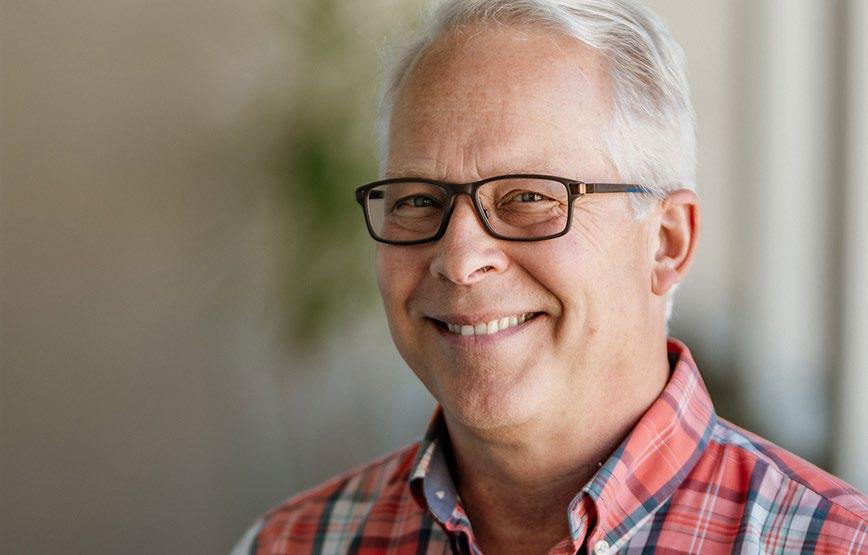
Michael Dick’s heart for mentoring has shaped a generation of MB leaders
BY HOLLY HANNIGAN
fter 39 years of service to the MB conference on local, provincial, and national levels, Michael Dick will be stepping away from leadership. We are grateful for all Michael contributed to our Mennonite Brethren family, most recently serving as the CCMBC Treasurer and Finance and Audit Committee Chair, and the Legacy Board Chair.
A“It is truly a gift to be a part of a group of people who are seeking the Lord and striving to lead well in ministry for His honour and glory,” said Michael. “But there are times one has to say I need a break from the additional pieces that fill my life and just be open to what God would have for me.”
Alongside his various conference positions, Michael is also Executive Pastor at South Abbotsford MB Church.
Michael moved to a half-time role in February.
Michael was first elected to the provincial and national boards of Christian Education in 1985. There,
he played a part in planning and facilitating the Banff National Youth Conventions in 1986, 1989, and 1992. These events brought 1,000 high schoolers together to connect and hear the word of God.
These events left a big impact on Michael, “The Banff conference was a significant part of my time because it was, you know, very transformative in the lives of many young people.”
In 1986, Michael was elected as Chair of the BC provincial board of Christian Education and, several years later, as the chair of the national CE board.
Michael served as the Executive Director of the board of Resource Ministries from 1994 until 2000. During this time he oversaw Kindred Productions, and one of the big projects that came out of his time was the publishing of curriculum that was based on our Confession of Faith and the core distinctives of the Mennonite Brethren Conference, “Faith, Family, Focus”, and “Word Wise”.
23 MENNONITE BRETHREN HERALD JUNE | JULY 2024
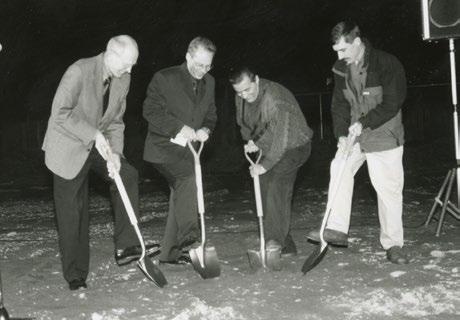
Michael did not forget about the world of education during this time. He served on a committee with MB Seminary, and was a board member and Chair of the board of Columbia Bible College from 1997 until 2004. These were notable years for Columbia Bible College with the building of Columbia Place, the renovation of the Student Centre, and the transition of Wally Unger as president.
“Those were significant years in the life of the college and it was great to be a part of that,” Michael said. Michael has seen many sides of the MB world while leading at the national, provincial, and church levels. Although challenging to balance, this opportunity allowed him to build rich relationships with leaders and pastors from across the country, giving unique insight into the impact and importance of the local church in partnership with the large family of churches.

“AS IRON SHARPENS IRON, SO ONE PERSON SHARPENS ANOTHER.” - PROVERBS 27:17
In 2012, Michael was elected back onto the BCMB Executive Board and in 2014 became their moderator. He also moved onto the National Executive Board in 2014.
He has supported the conference through several large transitions including the change of Stewardship Ministries into what is now Legacy and CCMBC Investments.
“We also led through the challenging season of the merger of C2C and Multiply, anticipating the Lord’s blessing on the local, national, and global impact of that decision. And then we also saw the really challenging de-merger season, and the impact on our conference ministries, provincially and nationally,” Michael remembered.
COURTESY OF THE MENNONITE
ARCHIVAL INFORMATION DATABASE (CA CMBS NP149-1-1894)
Right: Michael Dick speaking at a Canadian MB Conference convention.
COURTESY OF THE MENNONITE
ARCHIVAL INFORMATION DATABASE (CA CMBS NP149-1-2161)
Michael has been a part of three major governance transitions during the past 39 years, most recently the transition to the Collaborative Model and introduction of the CUSP. He noted that a governance model needs to “fit the times”.
“I would say, in many respects, our current collaborative model is one of the best for tying together the work of our churches to the provinces and to the national,” said Michael. “It really is a holistic and unified plan, that I quite like.”
As Michael steps away from these leadership roles he is looking forward to seeing what doors God opens, while embracing a period of rest and rejuvenation.
“I am certainly hopeful that I can continue to use the gifts and experiences gained from a lifetime of ministry to perhaps mentor or walk alongside younger leaders,” Michael said.
We want to thank Michael for his commitment and service to our conference and our churches. He has been a pillar for our community and we look forward to where God leads him in the coming years.
HOLLY HANNIGAN is the Communications and Content Management Coordinator for CCMBC and the Communications and Content Manager for MBCM.
Left: A sod turning ceremony for Columbia Bible College, held during a CBC annual meeting.
Pictured in the photo are (l-r) Walter Unger, Michael Dick, Fred Strumpski and Dan Wolff.
24 JUNE | JULY 2024 MBHERALD.COM
MB Church Legacy Accounts
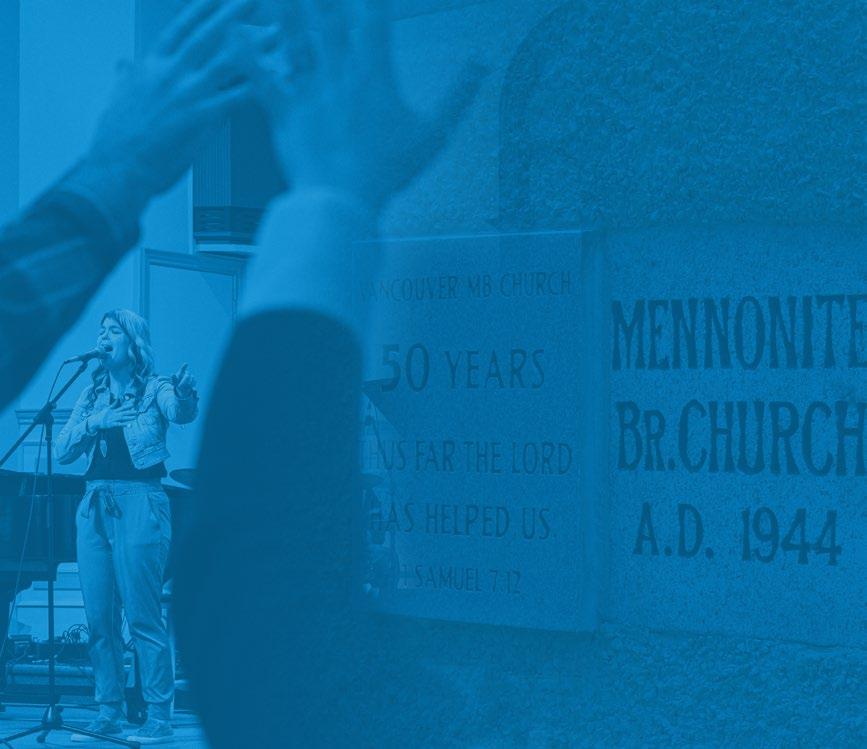
Is your church:
✓ looking to set aside unused operating funds until they are needed?
✓ saving for a building or renovation project?
✓ seeking to hold restricted funds?
1-888-669-6575 legacy@mbchurches.ca
5.0%*
You can now earn Get started today! on your MB Church Legacy account *per annum. Rate in effect January
2024
June
2024. Subject
change.
With CCMBC Legacy Fund, your MB church or MB organization can open an investment account with competitive interest rates. Our accounts are not locked-in, with no terms or fees included.
1,
to
30,
to
Women in ministry
COURTNEY ARMSTRONG EXECUTIVE DIRECTOR OF CAMP EVERGREEN (SUNDRE, ALBERTA)
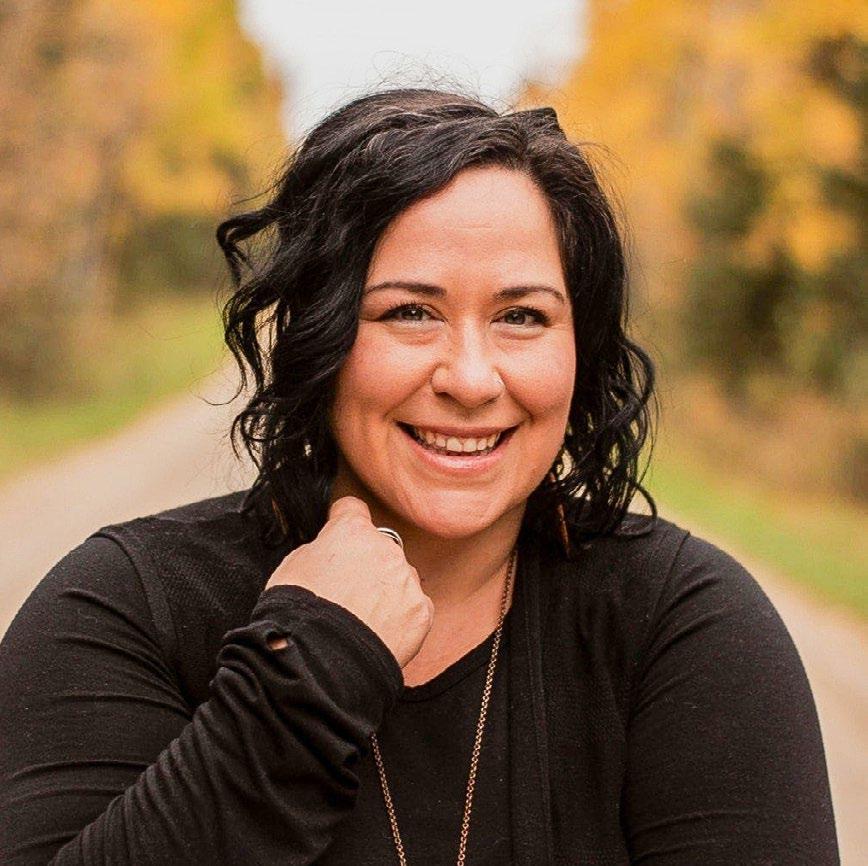
26 JUNE | JULY 2024 MBHERALD.COM
BY LEANNE JANZEN
How did God call you into ministry?
I always went to camp as a kid. Between grades five and eight, my parents separated, divorced, and re-married. So during those years, I was angry. I was a lot of things. But every summer, I went to camp. At the camp that I attended, my counsellor didn’t try to give me any platitudes. She just walked alongside me and allowed me to be angry, allowed me to sort through [my feelings].
One summer at camp, as I was starting to come out of that anger, I remember saying, ‘God, I want my life to be yours. My faith is my own, it’s not my parents’ faith.’
That same cabin leader used to write me letters (back when you could do that) and [in one of her letters] said she thought I would be a phenomenal camp staff and that I should plan on working at camp. She said that she was always going to be praying for me. I remember thinking to myself, “If I could be Kelly (that was her name) for one kid at a camp, it would be enough for the rest of my life.”
I had always planned, after graduating high school, to go work at camp. I never wavered from that. My first summer working at camp was at Evergreen, where I went right after high school. I worked there for five spring and summer seasons. As I was coming to the end of my university degree, I wondered if I should go back and get my Education degree. But there was also a guest groups position open at Camp Evergreen. So I decided to take a bit of time off school to work the guest group position. The following year I became
the program director and stayed on for a while. There was a point where I did step away to play rugby.
But God brought me back, which I hadn’t planned on. I remember driving down the gravel road [toward Camp Evergreen], and God said very clearly to me, ‘This is what I want you to do.’ I had this really strong feeling of coming home. It just struck me as very different from the other times when I was only staying for a little while.
Why is important to talk about women in ministry?
There’s a tension that sits between wanting to talk about it, but not wanting to whine about it. I always used to think, especially as an athlete, ‘I can do anything boys can do.’ That’s what I think the world considers feminism.
But I actually think the stronger feminist stance is [understanding] that men can’t do what women can do, and vice versa. God did create us equal, and yet uniquely different. This is why, in the gender conversation, it’s so important for us to say that we should not be the other gender, that we should be who we were created to be — to be mothers and fathers. That, I believe, is actually the truer stance of feminism — not to disrespect masculinity — but to embrace how God has made us [as women], emotions and all.
When we step into [who God has made us to be], we lead out of that uniqueness in a way that actually completes the family of God. As a woman, I am a spiritual mother. This kind of discipleship looks different than how a man would disciple.
When I started in ministry, I tried to lead like my male counterparts and mentors (because they were all men), but I found that I couldn’t. It created this unfeeling shield for me, because I felt like I couldn’t show emotion — I didn’t feel like I could be whatever a stereotypical woman is.
But that was a lie. And it was something I fell into for a long time. When I started realizing, no, I can’t lead like that. I need to lead as God created me to be, that’s when I stepped into what God had for me, as he has allowed me to lead at camp.
Do you remember what changed your perspective? Was it a slow progression or was there a pivotal moment? I think it was a little bit of both. It was very exhausting to try and cut off the [nurturing] parts of me as a woman. I have a really unique story, because I’m not just a woman in leadership, but I’m also single.
In my 30s I started to realize that I probably was not going to have my own children. It caused me to say, ‘Well, God, I still feel like I’m supposed to be a mother. What does this look like?’ That’s where God led me to understand what Paul means in 1 Corinthians 7 when he talks about being a spiritual father. God was not just calling me to be a spiritual leader, he was calling me to be a spiritual parent, to be a spiritual mother to my staff or to people who don’t have that person in their life.
How could the MB Conference better support women leaders? Talk about it. I think we’re getting to the place where, [with cultural identities like] gender and sexuality, we do talk about it as a church. But it’s still behind closed doors, in a softer tone of voice
THE MB HERALD INTERVIEW
27 MENNONITE BRETHREN HERALD JUNE | JULY 2024
The longer I’m in this position, the more I feel like God is taking [Camp Evergreen] to a place where the vision is bigger than I can comprehend.
because we’re afraid of who’s listening. We need to seek to understand what God has set out for women, for men, and for when it doesn’t matter.
I also think we need to be more concerned about spiritual parenting, and less [concerned] about gender roles. Personally, I think we worry too much about the person standing at the front. And we don’t worry enough about who we’re sitting next to, and what we’re doing to spiritually build them up as people.
How would you like to encourage other women who feel God’s call to leadership and ministry?
I would say it comes back to that spiritual mother piece. Start actively mentoring people around you and bring people into your family. I think of that moment when Jesus is on the cross, and he looks at his mother and he looks at John and he says, “This is your son, this is your mother now.”
Our world has rallied around the nuclear family. But God has said, you’re first responsible to the family I’ve given you. Who is he giving you to bring into your family? For any woman, whether or not you’re called into a formal position of leadership, you were called into leadership as a mother, to walk alongside, to pray, to teach, to nurture.
How can we pray for you, Courtney?
The longer I’m in this position, the more I feel like God is taking [Camp Evergreen] to a place where the vision is bigger than I can comprehend. A lot of leaders often struggle with the tension between dreaming big and [experiencing financial pressures], because money is always the stressor.
Our board has dreams that God is giving us, but the fundraising, the money, and all the questions that remain [are] too tangible to ignore. Pray that we would have the courage to say yes without having all the answers.
LEANNE
JANZEN lives in Saskatoon, SK and is a member of Faith River Christian Fellowship.

LOOKING FOR MISSION TRAINING?
Explore our mission training programs and find your place on God’s mission. Learn more at multiply.net/go
together that the world may know Jesus
28 JUNE | JULY 2024 MBHERALD.COM
The sun stopped shining
WHEN THINGS WENT DARK, GOD PREVAILED
BY PHILIP A GUNTHER
“EVEN WHEN I WALK THROUGH THE DARKEST VALLEY, I WILL NOT BE AFRAID, FOR YOU ARE CLOSE BESIDE ME. YOUR ROD AND YOUR STAFF PROTECT AND COMFORT ME.”
PSALM 23:4 NLT
“I WOULD RATHER WALK WITH GOD IN THE DARK THAN GO ALONE IN THE LIGHT.”
MARY GARDINER BRAINARD
April 8, 2024, millions of people from around the world watched a total solar eclipse of the sun. Many travelled to place themselves in the Path of Totality where they would experience the moon completely blocking the light from the sun. It was an event of a lifetime for all. For some it was an impactful emotional or spiritual experience. I was most affected by the scenes of darkness I watched on TV. It was literally like nighttime in the middle of the day!
This astronomical event made me think about another time when darkness struck during the middle of the day. As Christians, we read these words every Good Friday from the Gospel of Luke: “It was now about
the sixth hour (noon), and darkness came over the whole land until the ninth hour (3 pm). For the sun stopped shining” (Luke 23:44-45a). Nearly 2,000 years ago, after Jesus had already hung on a Roman cross for three hours, the sun was divinely darkened during the crucifixion of Jesus. It was not an eclipse which lasts only minutes, it was a darkness over Calvary that lasted some three hours.1 Luke’s testimony – “The sun stopped shining” or as another translation reads, “The light
1 In addition, the crucifixion occurred during Passover. Passover took place during a full moon and an eclipse could not have occurred at the same time as a full moon.
29 MENNONITE BRETHREN HERALD JUNE | JULY 2024
n










In the darkness Jesus was bearing upon himself the sins of humankind. What was unfolding in the darkness was Jesus’ work for our atonement, expiation, redemption, rescue.







from the sun was gone” (NLT)–caused a distinct disquiet in my spirit. The people in the Path of Totality in 2024 experienced darkness for moments, and those at Golgotha would have experienced a supernaturally orchestrated darkness for three hours! As those who crucified Jesus sought to snuff out the Light of the World by nailing him to a Roman cross, the greatest physical light of the world was being darkened by the hand of God. I now have a greater appreciation for the centurion at the foot of the cross who could not help but exclaim, “Surely this man was the Son of God.” As well, I better grasp why many who witnessed the blackout on that Good Friday were terrified and “beat their breasts” at what was happening. 2 Another translation reads: “They went home in deep sorrow.”
The April 8th solar eclipse was amazing, but in and of itself was likely life-transforming for none. The darkness over Jerusalem – over Calvary – was momentous, but it too was likely life-transforming for none. However, what was unfolding in the darkness at Calvary was not only spiritually cosmic, but historically cataclysmic! In the darkness Jesus was bearing upon himself the sins of humankind. What was unfolding in the darkness was Jesus’ work for our atonement, expiation, redemption, rescue. What was unfolding in the darkness was the battle for our souls. It was the greatest expression of love: “God demonstrates his own love for us in this: While we were still sinners, Christ died for us” (Romans 5:8). What was unfolding was a rescue: “For he has rescued us from the dominion of darkness and brought us into the kingdom of the Son he loves, in whom we have redemption, the forgiveness of sins” (Colossians 1:13-14). And, although some form of solar eclipse happens annually, the darkness at Christ’s crucifixion will never be repeated: “Christ died for sins once…” (1 Peter 3:18).
2 Luke 23:47-48
Have you ever considered what the darkness over Golgotha may have symbolized? For me, the three hours of mid-day night symbolized:
˚ The galactic battle between God and Satan. Here was a conflict between good and evil, light and dark, forgiveness and condemnation, salvation and judgement, heaven and hell.
˚ Humankind’s wickedness and blindness. The darkness of the human soul. In her book Contemplating the Cross Tricia McCary Rhodes writes, “God gives them a sky that matches the blackness of their own hearts.”3
˚ God’s wrath and judgment. In Scripture, darkness is associated with God’s wrath and judgment. For example, the Lord plunged Egypt into darkness as a demonstration of God’s judgement against Pharoah. Isaiah writes that at the coming of the Lord’s judgement, “The rising sun will be darkened” (Isaiah 13). Amos writes that when the Lord brings judgement he would “make the sun go down at noon and darken the earth in broad daylight” (Amos 8).
˚ A tangible expression of Isaiah’s prophecy coming to fruition: “Surely he took up our pain and bore our suffering, yet we considered him punished by God, stricken by him, and afflicted. But he was pierced for our transgressions, he was crushed for our iniquities; the punishment that brought us peace was on him, and by his wounds we are healed. We all, like sheep, have gone astray, each of us has turned to our own way, and the L ORD has laid on him the iniquity of us all” (Isaiah 53:4-6). Again, Rhodes writes, “With every second, Jesus swallows more of mankind’s sin. Every disobedient deed…flows
3
Tricia McCary Rhodes, Contemplating the Cross (Bethany House, 1998), 139.
30 JUNE | JULY 2024 MBHERALD.COM
like poison into his very soul.”4 “Evil fell into the heart of Jesus,” penned Timothy Keller.5
˚ Creation’s rebuke of humankind’s crucifixion of the Creator’s son. In the Genesis creation account, when the earth was in chaos, “darkness was over the surface of the deep” (Genesis 1:1) Into this space the Creator brought light. At the crucifixion God removed creation’s light and plunged the “world” (the site of the crucifixion) into darkness—chaos. When the Light of the world (Jesus) was being snuffed out, the Creator responded by darkening the light of the sun.
˚ An act of compassion toward Jesus and humankind. The great preacher Charles Spurgeon, in his 1866 sermon The Three Hours’ Darkness stated that God the Father furnished “our savior with a retiring room, not that He might get a shelter, but that He might now be able to do His great work—bear the full weight of our sins and endure the extremities of the divine wrath? I must not say it, but I do think it would have been impossible for human eyes to have looked upon the Savior when He was in the full vortex of the storm of wrath which fell upon Him—and that God, even in mercy to man, shut to the door that man’s eye might not see the Savior in that fearful extremity of misery.”6
As quickly as the darkness descended upon those at the foot of Christ’s cross, it was lifted. The mid-day night ended with the final words of Jesus in his dying breath: “It is finished…Father, into your hands I
commit my spirit.” 7 The crucifixion and death of Jesus was not a victory over Christ and the Kingdom of God, but signaled the defeat of Satan, sin and death. The return to light symbolized God’s grand story of redemption and restoration moving one step closer to fulfilment. The resurrection, ascension and second coming would complete the divine narrative. Now, the claim of Jesus before his crucifixion would take on new meaning with the glorious return of the sun’s light over the cross at Calvary: “I am the light of the world. Whoever follows me will never walk in darkness but will have the light of life” (John 8:12). The sun’s light still shines over our lives today as does the Son’s offer of life in the light with him.
What are some tangible responses to this part of the gospel story?
˚ Appreciate just how deeply this darkness over Golgotha might have impacted those who experienced it.
˚ Understand the depth of Jesus’ sacrifice for you, which the darkness symbolized.
˚ Thank God for his great love in sending Jesus, for the victory that was won at Calvary and the power of the cross to rescue us from spiritual darkness.
˚ Live every day in a manner that reflects your debt to Jesus. The judgment of utter darkness apart from him, which was your inheritance under “Adam,” is now not yours under Christ.
7 John 19:30; Luke 23:46
4 Tricia McCary Rhodes, 139.
5 Timothy Keller, Jesus the King (Riverhead Books, 2011), 231
6 https://www.spurgeongems.org/sermon/chs3471.pdf






REV. PHILIP A GUNTHER is director of ministry for the Saskatchewan Conference of MB Churches
“Your light, poor weary sinner, is not the candle… of your own dark heart, but the sunlight of the cross. Look there, and you shall be of good comfort, for to him who looks to Christ, light shall arise out of the darkness.”








Charles Spurgeon




31 MENNONITE BRETHREN HERALD JUNE | JULY 2024
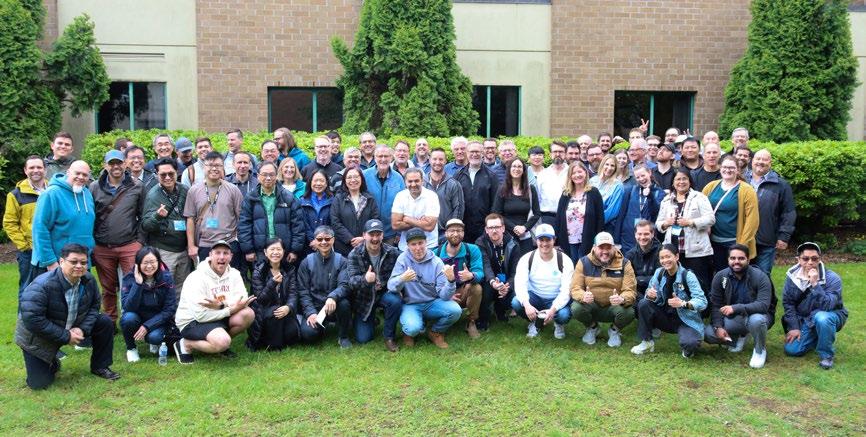
Rain, hail, and hot springs!
More than 70 new pastors, provincial leaders, and CCMBC staff met together in the Fraser Valley for PCO 2024 (Pastors Credentialing Orientation)—a yearly event to orientate and welcome new pastors joining our Mennonite Brethren family. This CCMBC sponsored event drew new pastors, both men and women, from Whistler, BC to Borden, Saskatchewan to Montreal, Quebec.
Some were younger pastors just beginning their ministry journeys while others were seasoned pastors joining our MB family after lengthy tenures of service in a different denomination family. There was also a wonderful mix of ethnic backgrounds reminiscent of the Kingdom picture from Revelation 7:9 of people from “every tribe, nation, people, and language” joining together for corporate worship. They spent two and a half days worshipping, learning, talking in small groups, laughing together, walking together, and
certainly eating together. New friendships were formed; tough questions asked; and prayers offered to bless churches and leaders across our country.
Participants went on a whirlwind tour geographically from Columbia Bible College to MCC British Columbia to the Multiply offices to Harrison Hot Springs which is the location of Central Community Church’s Harrison campus. They heard presentations about our MB church origins, our MB ministries (and some related ministries), our MB Confession of Faith, our MB biblical interpretation model, our MB commitment to a Jesus-centred leadership model, as well as how to embrace healthy ministry rhythms for the long-term. The group lived through pouring rain, hail, and the sun coming through the clouds which provided almost a metaphor for the many challenges facing all church leaders in today’s world.
All of this concluded with outgoing BCMB Conference Minister Rob Thiessen leading the group through a time of communion, which was followed by a symbolic “graduation ceremony” with clapping and cheering for each new pastor in our family as they received a graduation certificate. Participation at PCO is one part of the provincial credentialing process for new pastors. Each pastor returned home to continue work on their credentialing questionnaire which will be processed during in-person interviews with provincial leaders who are part of provincial faith and life teams.
Remember to pray for these new pastors as they serve King Jesus in all sorts of diverse ministry settings across our country! May the Holy Spirit empower and bless them as they minister there!
– MB HERALD STAFF
PCO 2024
32 JUNE | JULY 2024 MBHERALD.COM
Finish lines
MARGARET WIENS

One of Margaret’s greatest childhood memories was of her parents buying a beautiful Gerhard Heintzman piano. By the age of 17, she was playing for the choir and congregational singing at her church, and she continued to serve in the many churches that she and Bill attended. Margaret enjoyed playing the piano until the last few years of her life. She often played her favourite hymn “It Is Well with My Soul.” Margaret’s children and grandchildren were her greatest joy. She faithfully served her family with love, wonderful cooking, and prayer that they would love the Lord and the church. She lived out her life with the knowledge that “by grace you have been saved through faith, and this is not from you; it is the gift of God” (Ephesians 2:8). Margaret died with several of her children spending the day at her bedside. She is now reunited with Bill, her husband of 70 years; her daughter Janice; and four of her younger siblings.
Birth: November 28, 1928 Birthplace: Brotherfield, Sask. Death: February 19, 2024 Parents: John & Helena (Isaak) Willms Married: Bill Wiens, Mar. 31, 1950 [d. Jan. 2, 2020] Family: children Ray (Kathryn), Leroy (Ruth), Stanley, Geraldine (David) Pauls; 12 grandchildren; 32 great-grandchildren; siblings Art (Elsie) Willms, Alden (Lynn) Willms Church: Silverdale, Mountain View Gospel Chapel, Mission, B.C.; Harrison Hot Springs, B.C.; Central, Chilliwack, B.C.; Central Heights, Abbotsford, B.C. Baptism: Matsqui (B.C.) MB, 1946

RUBINA (RUBY) ANNIE ENGEL
Ruby was born in Hepburn, Sask. She, her parents Henry and Annie Unruh, and sister Verna moved to Abbotsford, B.C., in 1945. Ruby was a member of Clearbrook Mennonite Brethren Church for many years, though she served at the newly planted Lake Errock church for several years. She supported and prayed for many missionaries. She was a caring auntie to her niece Debbie and nephew Tony. Ruby worked at Funks’ Super Market for 21 years. Later she was a volunteer at Hidden Treasures Thrift Store. In 1991 she married Richard Engel and

ABRAHAM KONRAD
With sadness and thanksgiving, we announce the passing of Abe Konrad, Apr. 6, 2024. Abe was born in Mexico en route from Russia, and grew up in the Peace River area of Alberta. He was married to Mary Konrad for almost 68 years and together they lived in B.C., Alberta, Manitoba, and Ontario, pastoring Mennonite Brethren churches in each of those provinces, including 9 years at King Road Church in Abbotsford, B.C. Abe is predeceased by his daughter Edith, and grandson Dominic; his siblings Henry, Elizabeth, Jake, Hulda, and Dan; and his wife Mary.
Birth: March 22, 1926 Birthplace: Irapuato, Mexico
Death: April 6, 2024 Parents: Abraham & Elizabeth Konrad
Married: Mary Wiens, July 16, 1952 [d. May 11, 2020]
Family: sons Alfred, Ernest (Tia), Wilfred (Angela), Wesley (Valerie), Chester (Pauline); grandchildren Jennifer, Ryan (Chastidy), Dylan (Ruth), Brittany (Karl), Tyler, Nathan (Mara), Delaney (Aldo), Franklyn; great-grandchildren Noah, Bentley, Tucker, Ashley, Carter; sisters Helen, Irene
Church: Leamington (Ont.) MB (now Meadow Brook); Niverville (Man.) MB (now Fourth Avenue Bible); Portage Avenue, Winnipeg; King Road, Abbotsford, B.C.
Baptism: La Glace (Alta.) Bible Fellowship, age 18
became part of his extended family, which included his 4 children, Mark, Jill, Jane, and Lisa. Richard passed away in 2008. Ruby quietly passed into the presence of her Saviour on Mar. 29, after four months of declining health. Ruby has many lifelong friends and caring neighbours who will miss her thoughtful presence in their lives.
Birth: March 19, 1933 Birthplace: Hepburn, Sask. Death: March 29, 2024 Parents: Henry & Annie Unruh Married: Richard Engel, 1991 [d. 2008] Family: niece Debbie; nephew Tony; stepchildren Mark, Jill, Jane, Lisa Church: Clearbrook MB, Abbotsford, B.C.
33 MENNONITE BRETHREN HERALD JUNE | JULY 2024
 MARILYN (HALBE) BRAMWELL
MARILYN (HALBE) BRAMWELL
Marilyn grew up in a Christian home. Her dad was a logging contractor, and he and her mom raised Aberdeen Angus cattle. Marilyn was baptized in June of 1958 at Black Creek (B.C.) Mennonite Church, where she taught Sunday school, sang in the choir, and was involved in many church activities. After graduating from high school, Marilyn went to university in Victoria to study accounting. When she finished, she joined the Mercantile Bank, now Citibank. She visited family in Germany, set up audit systems across Canada, and spent time in New York. For several years, she lived with her sister Audrey in Vancouver. They shared many adventures such as shopping, going to the beach, attending symphonies and ballets at Queen Elizabeth Theatre, and travelling together in Europe. In 1970, Marilyn met Bill Bramwell, and they were married at Black Creek Mennonite Church, May 8, 1971. They made a home and many friends in different communities, including Vancouver, Regina, Calgary, North Vancouver, Richmond, Tsawwassen, Burns Lake, Victoria, Bella Coola, Kamloops, and Abbotsford. Marilyn worked for the Canada Revenue Agency and had her own small practice specializing in legal accounting. Marilyn and Bill were joined by daughter Charlene in 1973 and son Michael in 1976. Marilyn’s life was filled with happy times on their boat, cruising the Gulf Islands and San Juan Islands, and at their cabin in Birch Bay. They often visited family in Black Creek, Kelowna, and Vancouver, Wash. Together Marilyn and Bill loved to offer hospitality. At South Delta Baptist Church, Tsawwassen, B.C., they served communion and participated in Marriage Matters and Strawberry Teas. They volunteered at Tsawwassen First Nation Reserve. Marilyn provided pastoral care at Delta Hospital and the Abbotsford Hospice. She made many lifetime friends and continued to gather monthly with her Beta Sigma Phi sorority sisters until a few months before her death. Friendship, community service, and social gatherings filled her life with joy. Marilyn loved her dear friend Joanne Jones, who was a pillar of support during her illness. Marilyn enjoyed cooking, entertaining, gardening, and boating. She also appreciated classical music and hymns and had a special love for the elderly. She will be remembered dearly for her amazing dinners, beautiful garden, and generosity to her friends and family. Marilyn was a kind, strong, and intelligent woman who left a lasting impression. She died peacefully with family at her side.
Birth: September 17, 1940
Birthplace: Comox, B.C.
Death: February 19, 2024
Parents: William & Agatha Halbe
Married: Bill Bramwell, May 8, 1971 Family: Bill; children
Charlene (James) Martyn, Michael; grandsons Gabriel, Luke, Caleb, Jacob, Ronan; sister Audrey Halbe; sister-in-law Dawn (Rick) Campbell; nieces Kym, Kristen, Kari; Bill’s sister-cousin Arty Church: Clearbrook MB, Abbotsford, B.C. Baptism: Black Creek (B.C.) Mennonite Church, June 1958

JOHN C. DYCK
Amid the Russian Revolution, John’s father put his young family in a borrowed wagon to Moscow, 400 miles away. They reunited with extended family in Landmark, Man. At 17, John was conscripted. Because of an ear infection, he was rejected but reapplied as a conscientious objector.
At Yarrow MB Church, he accepted Jesus as Saviour and was baptized. Meeting his sisters’ friend Elvira Harder developed into a lifelong love and mutual service to God’s family. They married Sept. 24, 1950, and moved to Vancouver where John ran a construction company. They built their own house, a cottage outside Mission, B.C., and cabins for Columbia Bible Camp. Despite his growing business and family, which now included daughters Marilyn and Elizabeth, John felt dissatisfied, until Vancouver MB Church asked him to build a new church in Burnaby, B.C., Willingdon MB. As his first daughter entered Grade 1, John entered his first year at Vancouver Bible Institute. He rose early to direct his building crew, then hurried to school from 7 a.m.–1 p.m., returned to his construction sites until 5 p.m., then did homework until 1 a.m. In 1963, he became Vancouver MB’s youth pastor. In Burnaby, Edward was born. They returned to Vancouver where John completed Grades 11–13 in 2 years (1965–66). John continued youth work at Vancouver MB while building a home in Richmond and welcoming son Robert (1966). After building the Culloden Church, John began seminary studies while pastoring Richmond Bethel. In 1969, John returned to Vancouver MB Church as assistant pastor, graduating with a BTh from Northwest Baptist Seminary a year later. He was associate pastor at Culloden MB Church and was ordained within the MB conference. In 1981, John became associate pastor at Clearbook MB Church, where he and Elvira loved working with seniors. They were loved back: when their Richmond house didn’t sell, they faced great loss—until a church member heard of it. Within days, church seniors had paid the loan (and were reimbursed when the house sold). John filled the years after his 1987 retirement with construction projects for his children and Lithuania University; disaster relief work; road trips to New York, California, and Alaska; and happy hours in his workshop with his grandsons. He was grieved to lose Elvira in 2022 and followed her to meet the Lord Dec. 13, 2023.
Birth: May 22, 1926 Birthplace: Arkadak, Russia
Death: December 13, 2023 Parents: Cornelius & Susanna (Guenther) Dyck Married: Elvira Harder, Sept. 24, 1950 [d. 2022]
Family: children Marilyn Schroeder (Harry), Elizabeth Parberry (Dale), Edward (Linda), Robert (Shannon); 10 grandchildren; 10 great-grandchildren Church: Clearbrook MB, Abbotsford, B.C. Baptism: Yarrow (B.C.) MB, age 17
34 JUNE | JULY 2024 MBHERALD.COM
 HILDA JUSTINA DURKSEN
HILDA JUSTINA DURKSEN
FRIESEN
The middle child of 4 brothers and 4 sisters, Hilda was born minutes after her twin, Helen. Her chores were milking cows, cutting grapes, and hoeing vegetables. At a young age, Hilda contracted rheumatic fever, which weakened her heart, but that didn’t slow her down. When Hilda was 8, her family moved to be closer to a Christian high school, choosing Eden Christian College near Virgil, Ont. Hilda completed a 7-week teacher training, then went up north to teach a one-room school. Fast forward 5 years, when Hilda, now back in Vineland, met and married the B.C. boy with the brush cut who was selling brushes door to door. She said yes with two provisions: the brush cut and the Fuller Brush job had to go. The new couple moved into a 136-square-foot dormitory at MB Bible College, Winnipeg. Hilda taught school while Walter studied. A similar arrangement was made for their 3 years in London, Ont. In 1970, when Walter was hired by Harbour of Hope Chapel, the couple moved to Port Edward, B.C. There, they adopted their first child, Mark. In 1972, Hilda helped build their house in Abbotsford, B.C., from pouring the footings to nailing roof tiles. They welcomed another chosen child, Heather. In 1973, the family moved to Prince George, B.C., returning to the Fraser Valley in 1975. Hilda worked at Clearbrook Credit Union, the first of four teller jobs. A young client periodically had a small shortfall; she took care of it without drawing attention. Hilda loved telling wild stories and playing jokes; pretending not to know the rules of board games was a favourite. In 1982, the family taught English in China. Opening Modesta Hair Salon with her daughter was both exciting and hard. For their last mission to China in 1998, Jian Hua Foundation sent them to a high plateau to finish one school building, start the foundation of a second, and bring a Christian presence. Hilda’s outgoing manner was perfectly suited for this. Doing crafts with her grandchildren and camping at Derby Reach were special times. Grandma was always up for climbing into a rickety tree fort or swinging on a rope swing. She painted beautiful landscapes and street scenes. After retirement in 2004, Hilda served on the strata council of Cypress Park apartment building; she enjoyed being housemother. Her purpose in life was to walk with God and serve others.
Birth: December 28, 1939 Birthplace: Foam Lake, Sask. Death: March 26, 2024 Parents: Martin & Justina (Peters)
Durksen Married: Walter Friesen, July 25, 1964 Family: Walter; children Mark, Heather; 4 grandchildren; siblings Peter, Martin, Frank, Henry, Annie, Marian
Church: Clearbrook MB, Abbotsford, B.C. Baptism: Foam Lake, Sask. July 25, 1964
 VICTOR ADRIAN
VICTOR ADRIAN
Victor Adrian died May 14, 2024, at the age of 96. He was predeceased by his wife Helen in 2013. He was also predeceased by all of his siblings: Ella (2001), John (2020), Elfrida (1924), and Fred (2015). Victor was born May 23, 1927, to Johann and Katherina Adrian. He married Helen Schellenberg July 17, 1954. Together they had 5 children: Elaine (Stu), Wes (Rhonda), Tim (Barbara), Mark (Serena) and Matt (Janet). He enjoyed his 15 grandchildren and his 14 great-grandchildren. He served as instructor, and later president, of Mennonite Brethren Bible College from 1967-1972. After a sabbatical year, he joined Ontario Bible College as president; there he also founded Ontario Theological Seminary. He then served as director of Mennonite Brethren Missions/Services International from 1983-1992, at which time he retired. Victor loved theology. Reading and studying the Bible was an anchor point of his daily life. He continued to lead Bible study groups well into retirement. He also loved tennis and snooker, as well as golf, which he played into his 90s.
Birth: May 23, 1927 Birthplace: Rosenort, Man. Death: May 14, 2024 Parents: Johann & Katherina Adrian Married: Helen Elsie Schellenberg, July 17, 1954 [d. May 11, 2013] Family: children Elaine (Stu), Wes (Rhonda), Tim (Barbara), Mark (Serena), Matt (Janet); 15 grandchildren; 14 great-grandchildren Church: River East MB, Winnipeg
OBITUARIES HAVE LONG BEEN A VALUED PART OF THE MB HERALD . FROM THE FUNERAL BULLETINS, EULOGIES, AND NEWSPAPER OBITUARIES YOU SEND, OUR EDITORS CRAFT LIFE STORIES OF OUR MEMBERS TO INSPIRE AND ENCOURAGE OUR READERS, CREATING A MEMORIAL OF MB SAINTS. CLICK HERE TO SUBMIT AN OBITUARY
35 MENNONITE BRETHREN HERALD JUNE | JULY 2024
In case you missed it!
We regularly publish website-exclusive stories on mbherald.com. Here are a few articles we’ve posted online in the last few months.
On autopilot: A journey into the Genesis creation account: part six Pierre Gilbert shares how radical the account of creation would have been for its original audience.
Cassidy Grimm Memorial Bursary: Family honours daughter’s passion for education and helping others
After her tragic death, Cassidy Grimm’s family creates a bursary for Saskatchewan education post-secondary students.
Myanmar: ‘Being riskless is not always the will of God’: MCC’s partners in Myanmar provide food, work for peace amid armed conflict In Myanmar, MCC’s partners risk their lives to work for peace by providing food or choosing nonviolence.
Seeing Jesus: an Easter reflection
We have experienced the freedom and hope that Jesus brings! Yet so often we live a myopic life. Read more on the challenge to understand the complete picture of who Jesus is.
A girl called Ding: How an MCC partner in South Sudan was a refuge for a young girl’s future
MCC partner Loreto Rumbek School creates space for young women to grow, learn and express themselves in a safe and supportive environment.
MB .com 36 JUNE | JULY 2024 MBHERALD.COM
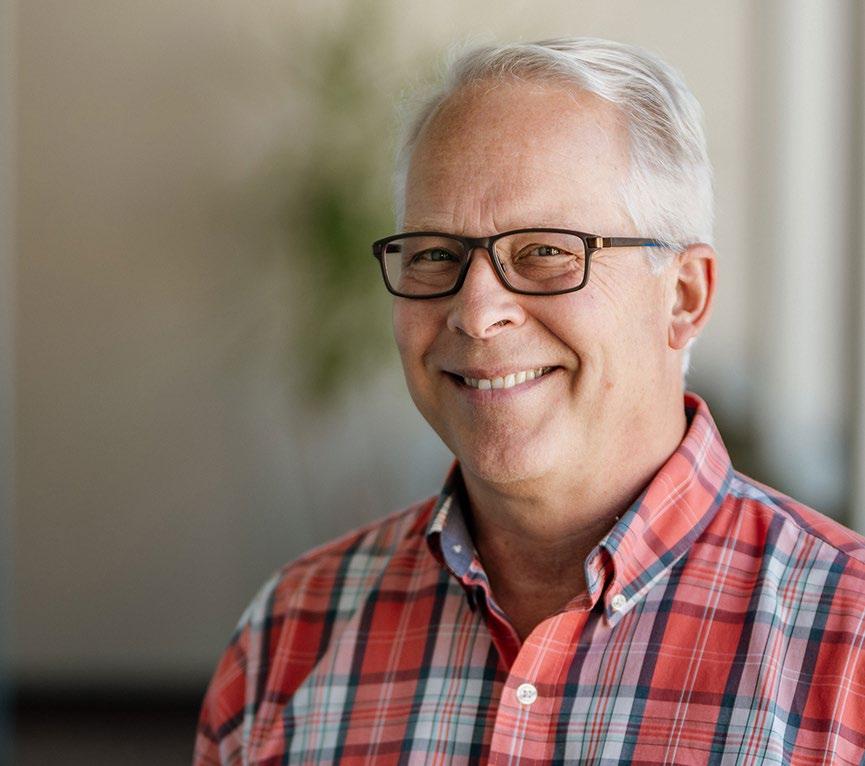
SUBSCRIBE TO MB HERALD DIGEST WWW.MBHERALD.COM/SUBSCRIBE-VIA-EMAIL














 Carson
CARSON SAMSON Communications director
Carson
CARSON SAMSON Communications director









































 MARILYN (HALBE) BRAMWELL
MARILYN (HALBE) BRAMWELL

 HILDA JUSTINA DURKSEN
HILDA JUSTINA DURKSEN
 VICTOR ADRIAN
VICTOR ADRIAN
